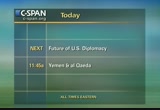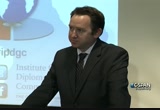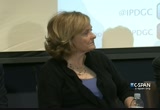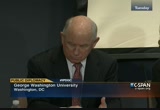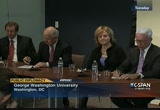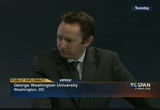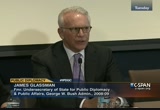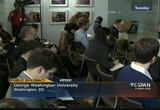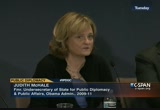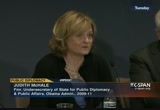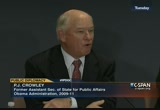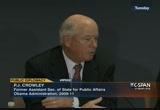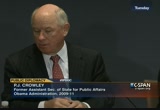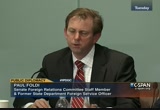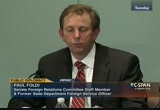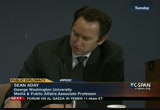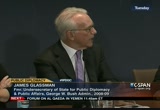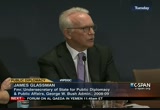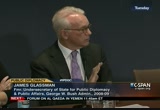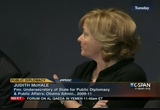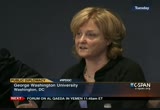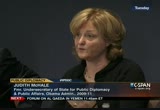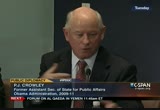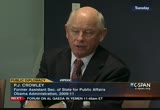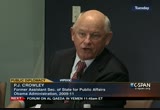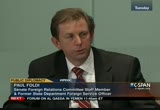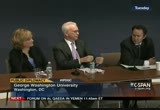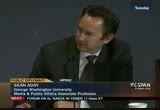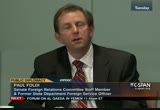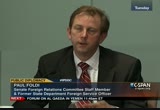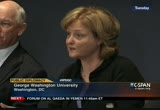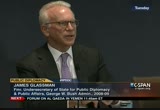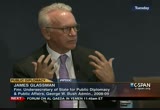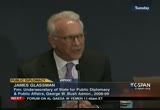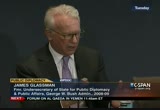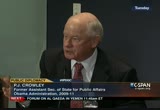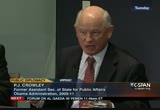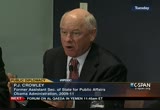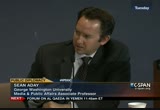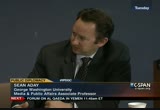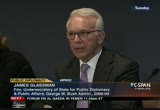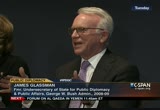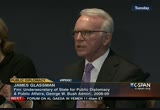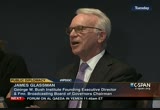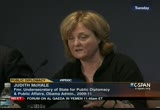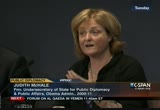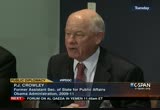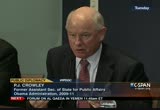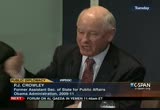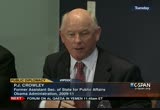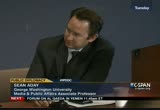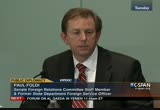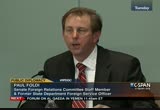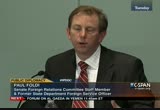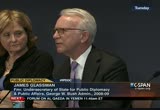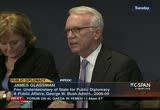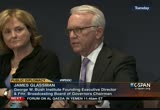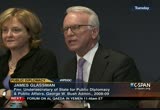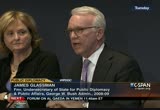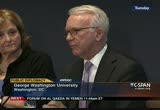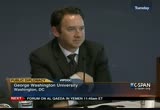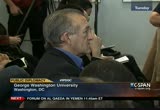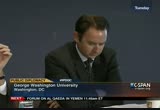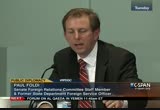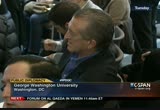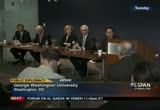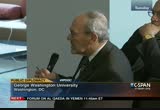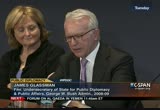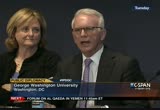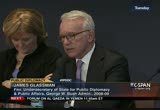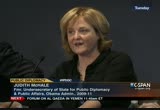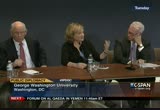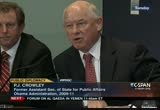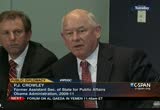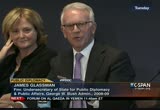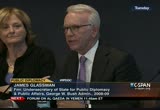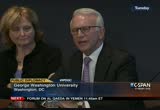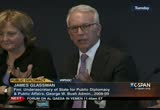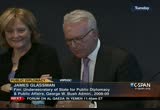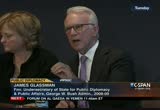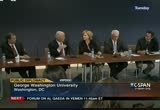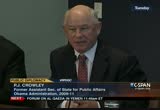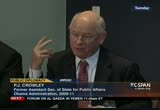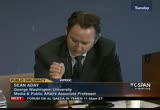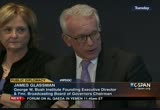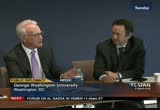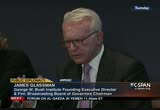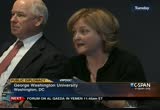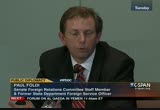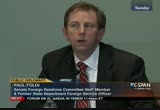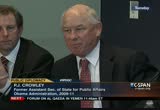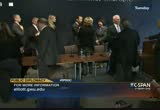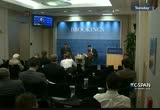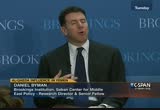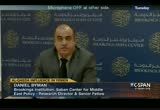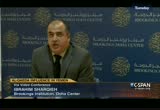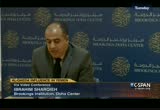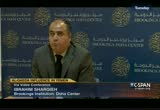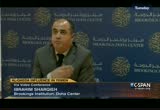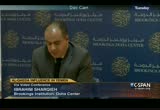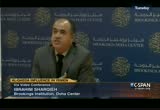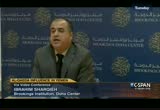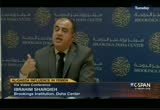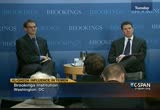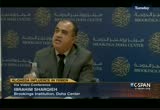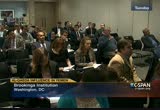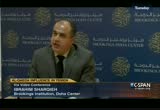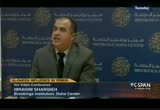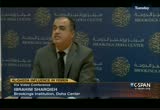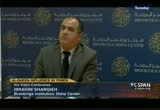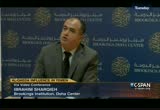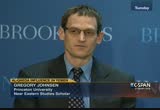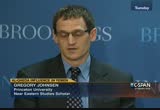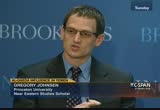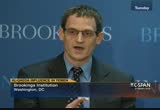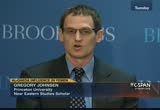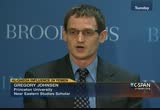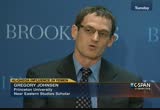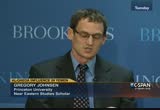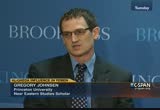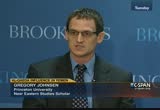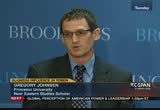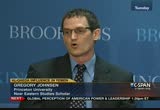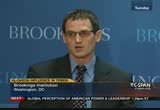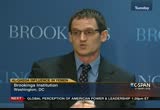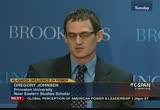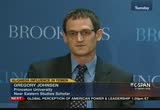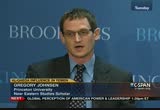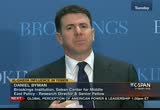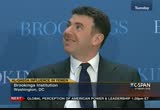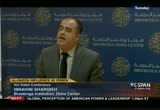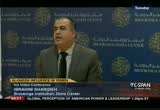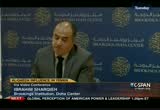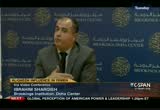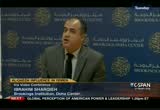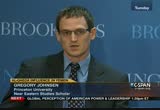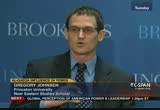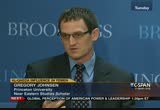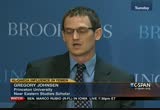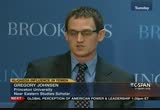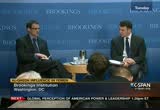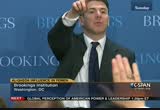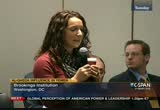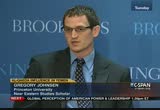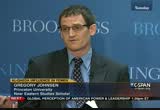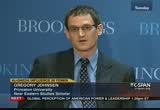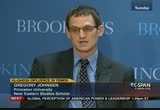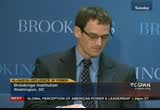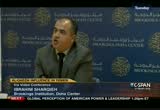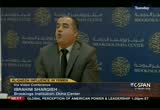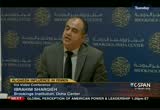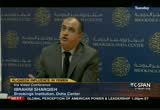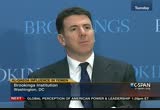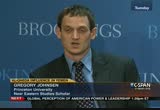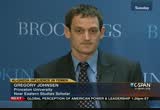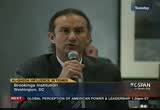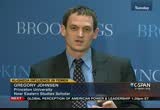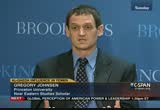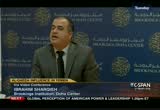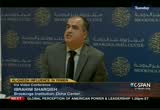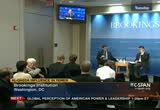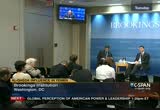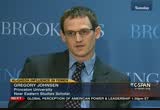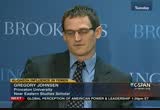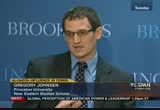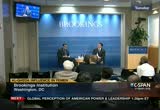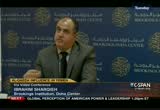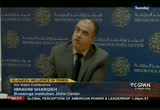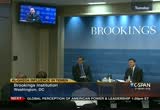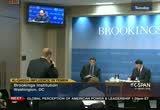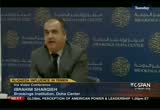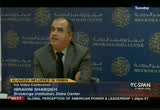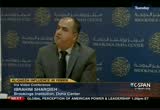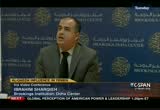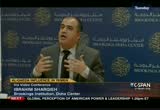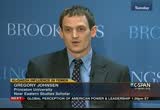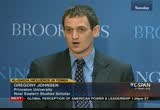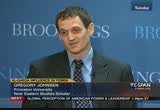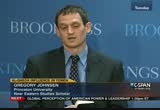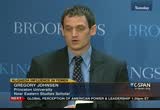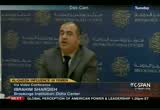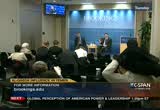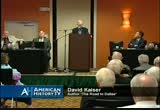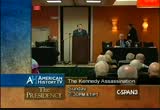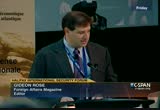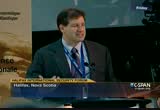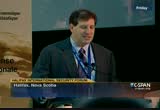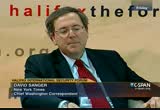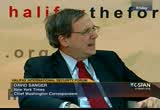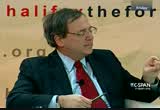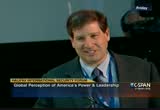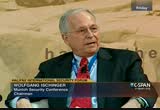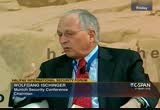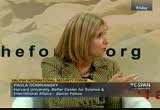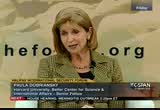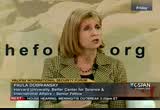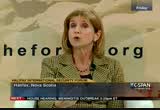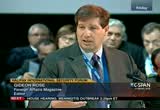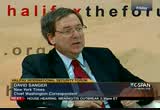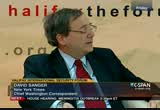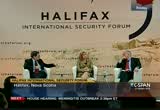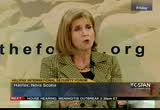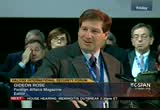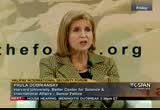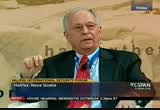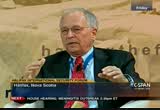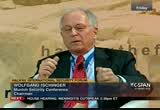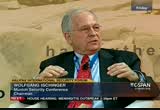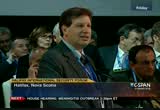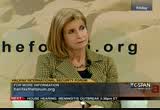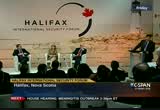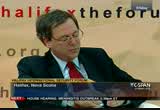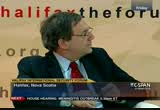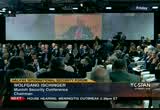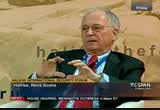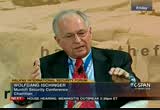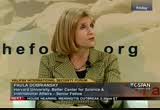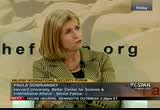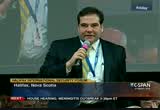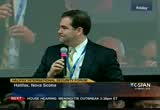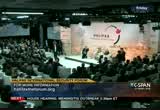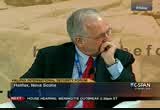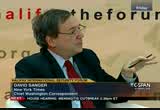tv Washington This Week CSPAN November 17, 2012 10:00am-2:00pm EST
10:00 am
at 9:15, the impact of new leadership in china on u.s. relations. president obama traveling in parts of asia. we will have those segments, plus, we will take a look at the papers and take your phone calls as well "washington journal ."shington, we will see you then. [captioning performed by national captioning institute] [captions copyright national cable satellite corp. 2012] >> next, a discussion on the
10:01 am
future of u.s. diplomacy. after that, a forum on the effectiveness of al-qaeda in yemen. >> a former state department officials from the obama and george w. bush administration's discuss public diplomacy in a tough budget in vermont. the discuss the effectiveness of student exchange programs and government-backed broadcasting outlets, like "voice of america." the george washington school of international affairs hosted this event tuesday. this is an hour and 45 minutes. >> that is public diplomacy in action. [laughter] i'm a professor here at gw and the director of the institute for public policy and global communication. you can find us on twitter @ip dgc.
10:02 am
we're also on facebook. we're hosting a conversation on twitter about this event,, hashtag ipdgc. what i will do to get as a rolling here is give a brief introduction and bio for our great panel here, and then get going into the discussion. we have a great -- with a lot of interesting people in the room. we need to leave time for discussion. first we have james glassman. executive director of the george w. bush institute. after a long career in journalism, he served as undersecretary of state for public diplomacy and public affairs. prior to his department post from june 2007-june 2008, he was chairman of the broadcasting board of governors. that is something we will be discussing today. judith mchale is the former undersecretary of state for public diplomacy and public affairs. she served from 2009 until just
10:03 am
recently, 2011-2012. >> until 2011. >> thank you. before that she was general counsel for mtv networks. paul foldi, from 1990-2003, served as a u.s. diplomat in the department of state, working at the u.s. mission in pakistan and nicaragua and various offices in each berman. congressional liaison for the u.s. ambassador to the united nations john negroponte. senator joe biden's foreign relations committee. he joined senator richard lugar where he served as the expert. p.j. crowley served as assistant secretary of state for public affairs in 2009. the assistant secretary and spokesman of the department of state until march 2011.
10:04 am
he's currently a fellow at the institute for public politick -- public policy here at gw. special assistant to the president of united states for national-security affairs, staff of the national security council, principal deputy for public affairs. air force, retired with rank of colonel in september 2009. i want to get started going back four years. the inauguration of barack obama. a lot was made at the time about how, at least on one side of the aisle, barack obama was a walking, talking example of public diplomacy in action. he was going to change america's perception in the world, and to all these wonderful things like clothes guantanamo bay and and torture. he went out -- close guantanamo bay and end torture.
10:05 am
four years later, opinion of america and things american have improved here and there, but certainly not to the degree that i think a lot of people, including people in the administration expected going into this period of time. if you look at the few global -- pew global attitudes index, opinion of the united states is in negative co territory for every country they serve it in the middle east, also china, it india. -- also india. the things that the rest of the world likes about america are movies, tv, science, technology. they're not keen on democracy as america preaches it. heading into another four years of the obama administration, where are we, and why are we here, and how do we get somewhere else? what went wrong, what is going
10:06 am
right, and what to do about it going forward? >> first of all, i do not think that favorability ratings and the pew surveys of evidence of whether we're doing something wrong or right. i think it is a huge mistake for anybody who practices public diplomacy to think that his or her job is to win a popularity contest. well i guess maybe some of us who were in the bush administration can take a certain pleasure in effect in 2008, the favorability ratings for the united states were higher in four out of the five surveyed arab countries -- i am not even going to bring that up.
10:07 am
[laughter] and it is a big mistake. in my view, and what i tried to do during my short tenure as undersecretary, is try to focus attention on what public diplomacy can do to achieve specific ends that are part of their goals in foreign policy and national security policy. that is what public diplomacy is supposed to do. if everybody loved us, it may be easier to achieve those goals. it is hard to get everybody to love us. it is a long-term project. it is much important, as president obama said in the very beginning, that we need to focus on mutual interests and mutual respect. there are many things that we can get done in that fashion. i think the public diplomacy
10:08 am
needs to focus on achieving specific, strategic goals. public diplomacy has failed in the last several decades when it has not focused on those goals. >> i am in agreement with jim on this issue. it is not a popularity contest. i am not just saying that. i think one of the things so we try to do, building on the base that jim and his team have put in place, was to be sure that everything we were doing in public diplomacy was designed to support the achievement of those goals and objectives to be very clear and precise in doing that. there are many areas where we do -- where we have we find areas of common interest,
10:09 am
science, technology. education, all those areas, even in countries where we have a difficult and challenging time, i have found that people were anxious to continue to have that conversation with us. we were constantly looking for ways, where are those avenues that are open that we can pursue. at the end of the day, to the extent we can expand and build mutual understanding between the people of our country and the people of countries around the world, we will be able to go down a more productive pat in the future. in the understatement of the morning, it is obviously very complicated. it is a complicated world in which we operate. things are changing very dramatically. for us as a country, one of the things i have found -- there are many obstacles you're going to encounter just by virtue of the fact that you are the last standing. when you are the last
10:10 am
superpower, naturally are going to encounter a lot of resistance. that is no reason to give up. to look for those avenues were you can pursue those conversations, where you can build relationships even in very difficult and challenging parts of the world. you do not ignore the research. you actually see that. you look at it. that should not be the measurement. >> nonetheless, while we will always be jealous because there will be something that a particular country -- for example, indians have expectations -- issues because there will be something that a particular country -- use it in between those two longtime
10:11 am
antagonists, you're going to end up disappointing both of them to some degree or another. one of the great challenges for public diplomacy is to bring the gap between words and deeds, to narrow that to the extent possible. public opinion polling is not the be-all, end-all, but it is a barometer that you need to pay attention to. only as you make sure there is a public diplomacy to mention in the policy making progress -- process, which is one of the the great challenges that all of us have worked in. do we take into account what global expectations are for the united states as the lone superpower, and that enters into our thinking about how
10:12 am
effective a particular policy will be. you're on a bit of a roller coaster. the challenge for barack obama was a expectations were so high coming into office. in year one, your two, -- year two, there was a restoration of confidence in the united states. predictably, as we made a run at peace between israelis and palestinians, in one part of the world there has been a corresponding disappointment when the attempt failed last year. we have to actually do both. we have to be focused on the long-term. that is a significant element of public policy. we have to pay attention to trends, and that should inform what are short-term and the term
10:13 am
actions are. >> a want to thank you for that question. -- i want to thank you for that question. i am here representing myself. but my words are mine. it reminds me of the difficulty we have in the field of public diplomacy. we do not have an agreed upon definition of public diplomacy. i always compare to, we never own definition of god and of public diplomacy. what you were describing is also strategic communications, which can be a much more short-term, results-oriented campaign, rather than public diplomacy which can take years. it could take years to get what i call the benefit of the doubt, which is the goal of public diplomacy so that when your country does something or has a policy that seems counterintuitive to the rest of the world, they go, they're in
10:14 am
demand states, for the most part we agree with them -- they're in the united states. for the most part, we agree with them. can we get back into the benefit of the doubt category with these countries. >> is it possible to get the benefit of the doubt -- is it possible to get the benefit of the doubt and significant portions of the world where we have immediate interest with a drone program? >> excellent question. [laughter] i am going to go maybe. the drone program has challenges. from the american perspective, this is great. clear not putting people's --
10:15 am
people in harm's way. i am not sure we understand the consequences that the drone program currently has in those countries where it is impacting. that is a "maybe." >> let me ask ambassador glassman and ms. mchale the same thing. from your perspective in your old jobs as undersecretaries, both of you came in in large part because of what you did when you were there, into a position that that job was one that had a lot more -- a lot more effort, with the approach to put public diplomacy at the takeoffs. that is of the that's started before the nine obama add the administration -- that is of the that started before the obama
10:16 am
administration, too. would you be counseling the administration, or how would you structure public diplomacy given the reality of the drone program and what is at least now the national security policy of united states? >> i know it was. during hughes who got that seed at the table. that was part of -- i know it was karen hughes who got that seat at the table. what public policy can do, being part of the takeoff and not just the crash landings, but we can do is say, if you have a strong program, it may be a great idea, but understand that a lot of people are going to be angry when innocent people are killed or maybe even when non-innocent people are killed.
10:17 am
that is about it. i guess i could argue that is a terrible idea to start with. to bring about some of the costs are as well as -- to bring up what some of the costs are as well as the benefits. the big problem we ran into all the time was that innocent people were killed. even when they were not killed, our enemies were saying that they were killed. we had to be very responsive, very quick on the draw and say, here is what really happened. but then we could not even admit that we were using drugs. that made it kind of difficult -- drones. that made it kind of difficult. i always felt that public diplomacy, even if you're in on the takeoff, you're not going to necessarily change the policy. the policy is a given, and your
10:18 am
job is in this case to mitigate the effects of the policy as much as you can. maybe this is not the time, but i have come to the conclusion that explaining and arguing how we did not kill that many people barbara did not kill any people is not very effective. it is not really -- or we did not kill any people is not very effective. i think i was still under secretary, i stopped explain. i do not think -- and stop explaining. i cannot explain it works very well. -- i do not think explaining works very well. that gets them more riled up. maybe this is not the time to go into that. i am not sure how effective you
10:19 am
can be. >> the most difficult needle we have to thread of public diplomacy, the apparent conflict between our core american values and some of our strategic interests. you do not want to get into a debate with someone about, we only killed two kids, not three. it is not a productive way to do that. it is very difficult for people to understand. it is difficult for citizens in our country to understand many of the things as we do. there is this tension between our national security interests and our core american values. i think all the you can do, and what we were trying to do to continue to strengthen those relationships to have a better understanding of all the dimensions of our country and its society and the benefits with it and to find those
10:20 am
avenues with the long-term view that you are building strong relationships. even if you have the best relationship in the world with any country, there'll be moments in time when your strategic interests are going to divert from theirs. that will be very difficult. you cannot avoid it. you have a simplistic view of the world if you think that is going to happen. in terms of public diplomacy having a seat at the table, what i believe is that it is important as policies are being debated and liberated, that they be informed by an understanding of how those policies may impact the people in particular in the country. that is critically important, the way the world is now changing. traditional power paradigm is two or three people at the top, debating how the things are going to go.
10:21 am
it is imported for our government and governments ever were to understand how their decisions are going to be received by broader society. you do not design a policy in response to public opinion in a particular country. that is not aware going to do. at least as those policies -- that is not what we're going to do. at least in those policies, know what the impact of those policies are going to be. things may be able to be changed to make what were otherwise unpalatable decisions somewhat more palatable to a broader population. that is the key role, and that is what we were trying to do with the organizational changes that we implemented at the state department with the new deputy assistant secretary of state positions we put in, to be sure that when those policies are being debated and decided upon,
10:22 am
they had the benefit of the information so that it was informed of fraud by what potential impact would be. did not want to be in a position where you would go and do something, then it would be received very negatively and everyone would be going, how come we did not know about that, or if we had known about it, we might have time did differently or communicated it differently. it is critically important to be there at the table up front to inform the policy makers. >> sean, drones are a perfect example of the problem of public diplomacy. ice-t strategic communication as a key element of public diplomacy. as the state department -- i see strategic communication as a key element of public diplomacy. drones are a weapon. a weapon of choice in the war
10:23 am
against al-qaeda, the war against terror. they are currently being used for a tactical purpose, a very beneficial tactical purpose. yet public diplomacy has to be strategic. the conundrum when you look at drones republic diplomacy lands is that the short term tactical effort -- lens is that the short term tactical effort is undercutting the long-term strategic goals. in the obama administration, we did have a robust strategic dialogue and strategic partnership with pakistan. our long-term strategy with regards to pakistan is to strengthen civilian governments
10:24 am
as the ultimate solution to dealing with extremism that is a threat to the united states, and a threat to pakistan. the use of drones, as appropriate as that may be, is undercutting the fabric of the relationship between united states and pakistan. because we are continuing to fly drowns in the face of a parliamentary -- drones in the face of a parliamentary report but said, stop doing it -- our visit to pakistan is, you're a partner -- our message to pakistan is, you're a partner, absent support by the pakistan government, that is an unsustainable situation. from a public diplomacy standpoint, what you want to get to is exactly what we have
10:25 am
cultivated over the last couple of years in the u.s.-yemen relationship. you had the president come to the united nations last september and say, i approve the key missions in terms of the use of drones in the context of yemen. we do not have that in the context of pakistan. ultimately, the long term public diplomacy effort is being sacrificed for a short-term tactical purpose. you can do that. as jim said, and some point you have to be mindful of the long- term cost for your short term strategy. >> the drug issue -- drone issue is a short-term issue. we're going to have -- what is
10:26 am
going to be the impact of the program on the long-term relationships, and depending on what our prayer public diplomacy relationship was with that country will tell you how successfully or unsuccessfully that program will be received. with yemen, they understood why we were using this methodology and why it did not seem to go against the grain of what that country had assumed -- the way we function. were public diplomacy is not working so strongly, it will be yet more evidence of the relationship that they see as deteriorating. >> you have established -- they're giving us the benefit of the doubt because of the strength of that relationship. >> one thing that is, already a lot is that public diplomacy is a long-term strategy or effort. that is usually a distinction made between it and strategic
10:27 am
communications. the long-term effort. -- being a long-term effort, one of the reasons why when we were putting together the panel, without it was important -- not to put you on the spot or anything -- [laughter] you have been in both. i am wondering from the former undersecretaries perspective, when you came into this position, and what did you discover, to your chagrin or not, about how working with congress when you are trying to do long-term efforts in the middle of hot wars where short-
10:28 am
term strategic communications goals are really at the forefront, and paul, from your perspective, where is the will in congress to do this? what is it that they would support? is it the controversies around funding for bbg et cetera, american centers seem to be popular. where is the will here, and where is it, and how do we get budgets for long-term efforts better -- whose effects are difficult to quantify? >> the good thing i have seen in my time of the hill is a public diplomacy has never taken a significant whack and other entities in the state department have taken. -- that other entities in the state department have taken. i believe was margaret tutwiler
10:29 am
who use this statement. she once said that if you use -- if you come to the united states for it of seven days, you are a tourist. we in congress understand the value of the exchange programs managed by the state department. that is why we continue to fund them. we continue to fund them even when they run into problems. we're so grateful for undersecretary mchale. exchange program traded after 9/11 murder brought high school kids and muslims to the united states -- exchange program trading after 9/11 which brought high-school kids, muslims to the united states. bringing borders to the united states to experience america will be beneficial both for the foreign guests and the communities where they live. many schools welcome the
10:30 am
opportunity to get foreign guests. i hope some of you participate in that or will embrace it when you get a chance. it is one of the great things that we do. the american centers continue to be funded. we understand will not be able to go out and build libraries like we used to, so we they do not work as a brick and mortar facility would. they do a great job. we can bring speakers into neighborhoods. some are run better than others. we could be at a saturation point where they want to make a new center. generally speaking, there is a understanding of the need for good funding in the united states congress. >> it is hugely challenging. if we give a fulbright scholarship to someone today, it
10:31 am
before 30 or 40 years becaus they become the president of their country. there are 30 or 40 senior officials who came here and were fulbright scholars. was it worth the investment? absolutely. at the same time, we have very real budgetary challenges. no surprises there. from my perspective, we woefully underfunded public diplomacy. you have to be realistic and world in whiche we operate. we put in place a number of processes to be sure every dollar was being strategically spence. and a line to our current policy. that was important to us to be sure we could go to congress and
10:32 am
say "we are spending this well." it is very difficult to measure. trying to develop measurement goals, at the same time congress has a very real obligation and they need to understand that this money is being well spent. you have backup the you are trying to manage. these have a huge impact. i am sure you meet people who said i used to go to the library. if you look at some of our competitors around the world, they are investing hundreds of millions of dollars. they understand the positive
10:33 am
impact you can have by sharing cultural history and having people understand your country and communities. we do not have the luxury of being able to do that. we're looking for ways to be more strategic. >> let me step back. he raised the question that we do not have a common definition of public diplomacy. it is the public to achieve the national interest. it is influencing. how do we do that? i co-chair a task force.
10:34 am
we invented the idea. this is something i never really thought the. they decide this in some broad terms. short-term is explaining and correcting the record. long term is exchange programs and the like. the medium term is using the tools to achieve medium term. that is to say a presidential term for, achieving specific goals during that time, what can we do a public diplomacy to stop the iranians from getting a nuclear weapon? the law turns up is where most
10:35 am
of the money gets spent. most of that money is set. there's not too much you can do about the fulbright budget. then there are all these programs that are named after congress. >> can mean a 1? name one? >> are those long term programs useful or not? our gut feeling is that they are. i will tell you a secret. we do not really know. it is not hard to come up with antidotes evidence that they do not always work. he was a former exchange to attend. his biography says it got them
10:36 am
all brought up in the first place. we do not really know. senator fulbright said that the program has been that the, standing in somebody else's shoes. i am a huge believer. should 2/3 of the money be spent on that? it is an interesting question. i think it is worth the debate. not enough money is being spent in the middle part. in the era of social media and very fast communication, whether we should be spending as much money in general on things called empathy, ok. in made a lot of sense 100 years ago. it does not make sense today to have this very complicated arrangement.
10:37 am
i am just throwing that out as a possibility. i think the whole thing needs to be rethought. we are certain that there is and not enough of the medium term focus. >> we will end up with six embassies around the world. just to add, not every object of public diplomacy rests with and the state department or within the security agencies. tom freedom suggested that the secretary of education should be part of the national security cabinet because it is essential to our competitiveness. the process comes down to you
10:38 am
have an x number of slots and then you choose widely -- wisely sometimes realizing that sometimes you will and sometimes not so much so. you have to recognize that when you have a list of the top 100 universities in the world, and we dominate that list. every student that graduates from asiabasic cause it's a visa stamp to their employee -- to their diploma. understanding the strength of our society and finding ways to leverage above for the benefit of foreign students, it is ultimately that appeal that
10:39 am
gives us the benefit of the doubt. it is being back magnets. we're very fortunate to have condoleezza rice as secretary of state. we made it harder for students to come and study the united states. we have to find ways to reverse this trend. we finally got ourselves back to where we had restored the flow of students to the united states from what it was pre-9/11. it is the larger relationship with the robber that -- would it
10:40 am
that is part of our national relationship. >> public diplomacy is not just the realm of the state department or any of the other government agencies. this is a critical role of the citizens of our country to play. did the businesses of our country, as secretary clinton put a big focus on getting our businesses out there and more engaged in communities around the world. it can have a very positive impact. i spent a lot of time looking at businesses and africa. we are woefully underrepresented across the continent in terms of the consumers' perception of the united states.
10:41 am
this would be helpful. there is a public diplomacy component to that. american businesses pack to have really good standards that can impact the economy is where they are going. our goods and have a positive impact on people's perception if we become part of their life. it is our universities billing. we have seen a huge number of our universities looking around the world to establish campuses throughout asia and the middle east that it had a very positive impact. it cannot and should not be just government driven. sometimes the private sector and our citizens go a lot farther in strengthening our public diplomacy than our government can.
10:42 am
and we have all heard that it is not americans we know. it is your policy or your government. that is the strain. we should figure out ways to continue to expand those opportunities. >> one thing we should underline about a long-term approach is a lot of the programs that seem to have support our programs and -- are programs aimed at young people. we have a significant portion of the world particularly in regions that were interested in it, i'm glad you mentioned africa with the growing competition from china, it raises the question of how we use social in new media to reach
10:43 am
these populations within the confines and constructs of the state department that they have to be on that and improved messaging. we saw this a pop up with the larry schwartz issue in cairo. we have seen its elsewhere too. we have seen a lot of efforts on the embassy and in iraq and bahrain. facebook walls are a base for true conversation. one of the things you emphasized was public diplomacy 2.0. that is something that has become ingrained and is growing. we see robert ford or others, how do we use social media in a way that is affected public
10:44 am
diplomacy but is not bad diplomacy? >> this is something they have done well. there were definitely foul ups there. the way the state department has done it works pretty well. people are encouraged to tweet and to use facebook. their courage to say thinks that run contrary to u.s. policy. the key is thought to have a layer of people that are looking over your shoulder all the time but to give autonomy to people out there doing the tweaking.
10:45 am
i really think this is revolutionary. one of the reasons i strongly believe that we need more public diplomacy is because at a time of tight budgets it is the most cost-effective way to achieve those natural interest goals that i talked about. it is amazing. the tools are there. the schools and not exist 10 years ago. thi realize that standing up and preaching at people, which i guess i'm doing right now is not
10:46 am
a very effective way to lacuna -- communicate. especially to foreign audiences. they did not want to listen to you. a better way to communicate this to use american authority to convene a deep conversation in which the messages are injected or distributed among other methods. we are part of the conversation rather than preaching with you. we had the tools for that conversation. as an approach it makes sense.
10:47 am
social media allows you to do this in a very effective way. i think it is very different -- difficult in a bureaucracy in which it is important to get away. the very first social media site in the federal government was created by the assistant secretary in my time called exchanges connect which i think is still going. i will never forget a meeting in which a lot of lawyers were sitting around saying i do not know. people can say everything on a site.ov we do not like that. if we are going to get into this game, this is the way we're going to have to do it.
10:48 am
it is fairly innocuous. they said we are going to do it. i think we can do more of it. i think we're doing it well. and you this is a terrific job picking up on the very early activities that we engaged in. we have to do it. >> we do not really have an option in this. when you look at demographics of the world's and the percentage of the population under 30, this is how people communicate. we have to be part of that conversation. we need to be in the marketplace. we need to understand what people are saying. you have to develop an authentic
10:49 am
way of communicating with people. the whole concept of authenticity is important. it is beyond putting together beautiful messages that you pop out into the system. it is difficult. government by its very nature is going to be less willing to takthe stick it net out. this is very difficult. people are concerned about it. you have missed the moment. you're not part of the conversation. we worked very hard to do that.
10:50 am
you have to train folks how to do it. the younger folks feel comfortable. you have to constantly encourage them. at one point, one of my fellow colleagues payback in said i went out. a set of is doing this for do this. i said no you are not -- jud ith. and i said "know you are not......." i was up late to have secretary clinton in her role. here is the scoop. there are going to be mistakes. people can say it quite seriously.
10:51 am
along with training, and you have to create an environment where you understand that is going to happen and it is not necessarily a career injured. we are working on it. it is absolutely essential that we do. when i came in, we notice that 70's are of our public diplomacy dollars were spent on a demographic over the age of 35. we said looking at the world, the fact is that you have a far better opportunity of planting the seeds with a younger demographic which is what i was so supportive of the program. he said it is so it difficult when you wreach those. when you're younger you have an ability to do that.
10:52 am
if we can have a good conversation with a young girl in pakistan she will be able to change the perception of the united states in a way that we never could. it is the wisest testament not just for the future but for whitright now. >> we have a clash of technology in future. it is going to play out. she came across this egypt influenced network. if you google it, it is this blob of blue, red, purple circles. to the blue are people tweeted in english. the right people in arabic.
10:53 am
the purple in both languages. having become one of the state department's more added twitterers. i had a fair number of followers. if you look at the map, i was off on the fringe. i was on the map but not in the middle of the conversation. that is the challenge. the technology does provide the opportunity to get in the middle of a conversation. they purposefully go en insert themselves into chat rooms to generate a debate and to try to change hearts and minds.
10:54 am
there is an opportunity here. inside the state department there is as great ambivalence about the technology. there is this tension of message and time. i think their shores in what he should have done. was his message perfect? not necessarily. it was on ultimately embraced by the state department. he had the disadvantage of trying to do the right thing. that is the great dilemma. you do have a robert ford who was used technology very
10:55 am
effectively pier in summit as me what he missed. i miss the opportunity to ts with hugoakeeg chávez. i would say it is generating a debate with in venezuela. they said this is a debate we will ultimately win. we have to be wary to let our diplomat engage in this debate. that is a phenomenon that will happen. we are probably 10 years away where our officers have embraced this technology. this is going to be a cultural
10:56 am
thing that works there chaining education and confidence. this will be how we eventually use technology to it bans public diplomacy. >> we definitely need to get a question. i would be remiss if i did not bring up bbg in the broader context of controversies. it is related to this topic. if we open up our facebook walls, as the consensus has been that we should, one of the things that is going to do is invite commentary that is very critical of the united states. then we have a member of congress thinking about why we're using taxpayer money to fund this discourse. re itve other problems whethe
10:57 am
runs into problems on the hill because of criticism of the budget or the oversight. what do you see in the next four years in terms of those challenges? what is realistic? >> i wanted to follow up on what he said. it is so important. the digital outreach team is an effort that you alluded to. they insert themselves to chat rooms that are not favorable to the policy. most domestic not wish to tread.
10:58 am
the problem i have with the concept of diplomacy is that oftentimes you cannot just be posing press releases on new twitter account. it cannot be a projection. you have to spend the time to respond to people. time is personnel. sometimes i think the department falls into this trap. they want to engage in a conversation. they do not just want to read online what they can see on television. it can be a trap of social media. it takes person power to do that. it is a generational thing.
10:59 am
they are going to understand better how to use that. the key will be have you really used to shake foreign-policy? the needs to be the realization that it cannot just be pushing uff. most people do not associate this with public diplomacy. it is a blending. for it is how we converse with the public who may not be receiving free and unfiltered news. it is the tension on capitol hill where should it be news or should it be the american version of the news? that is why there is the
11:00 am
firewall. reporting in his or her country or to have perhaps members of the other end of the constitution complaining about reporting. it is a constant tension. it'll never go away. it is public money. you have to be careful what you do public money. >> and want to increase the digital outreach team. everybody loves the digital average gain. i was talking to someone who is a former general who had a state department position.
11:01 am
he said how many people do you have doing that? he said eight. eight? are you kidding me? we would have 800 if we were doing this in the defense department. this is a good evidence of the problem. this is something that really works. i tried to expand it to russia which i think is a cool idea. i got shutdown by the embassy. it is a great idea. in needs to be bigger. the bbg has an impossible to is as to do twoeared things at the same time that are very difficult to reconcile. in my view they have done an excellent job of reconciling its. number one, it is a tool of
11:02 am
american foreign policy. it is a real journalistic institution. in need to abide by normal journalistic principles. talking to both of those things? it is hard for those who do not understand what the law actually says. i have, around to the view that the bbg needs to be brought into the broader foreign-policy making apparatus of the united states government. other was i just do not think it is going to survive. i think that attention needs to be resolved one way or another pie.
11:03 am
the way it works now is that we used to sit down a summit people from our state wants are twice a year and see what is on your mind? i hope when i was under the secretary of there was more guidance. i think there needs to be. the second thing is that there needs to be a reorganization of the bbg. have no head of agency. the board itself is the head of agency. the chair has no more than any other. i am not sure that it has been
11:04 am
nominated. this is the way they treat this emoneyation where mar monemor this spent -- more money is spent there than any other program. something needs to be done. they get a really bad rap from people who are not particularly well informed about what it does. it does an amazing job and more broadcastingressing mor more hours than cnn. we're not a lot to show anyone in the united states what is going on. here is a very valuable public diplomacy asset that is not being properly used. it is not the fault of the people at the bbg/
11:05 am
. >> the british may wish to have this. >> i agree. it has these constant leadership challenges. my sympathy goes out to those folks. it is very difficult to do. hopefully it will make it a more highly functioning organization. we need every tool that we have in our arsenal. we need to be able to deploy them effectively. i think this would make a lot of sense. you have to be aware of the fact
11:06 am
that it does have the journalistic standards. the whole concept of authenticity you need to have that. on the digital our reach, we folks on the team. we started to put together a toward auarter ver punching so we could take a bandage of the numbers they were able to deploy. it was in a much more coordinated function worse fates are providing. that was the plan to help provide the messaging into that group, whether that group was housed at state or dod on the theory that the civilian side of
11:07 am
government was better understanding the messaging. they can play in these really important conversations. i cannot tell you how often i would be out and people would say if you do not believe what we're saying, what are you saying it? one of the great strength of our country is that we debate. we can go into these environments. they are important for us to debate our core values. i think we will be stronger. this is one of the ways we really try to do that. it also takes the benefit of the folks who are there in the field and get their informations. >> when i said more guidance, i
11:08 am
certainly did not mean that the bbg should forsake or distort or jeopardize the journalistic value. that is very important. if the governors decide we're going to put all the money into india, it is their decision rather than being part of a more strategic decision making process. congress would get involved. >> there are certain countries they like to get rid of. >> please keep these questions brief so we can get as many as
11:09 am
possible. >> if you could identify yourself. >> the first time ever socking where was an 1967 in taipei. it was in chinese. now i work with two groups. one sur's the diplomatic community here in washington. what has happened with us is we take these people into our homes they then go back to their home country and remember us.
11:10 am
11:11 am
alumni. we were a bit perplexed. we found there is not a very effective alumni outreach as part of public diplomacy. that has changed. the concern was that we either brought folks to the united states are interacting with them overseas but we did not have an ability to reach out. could we tap that alumni network so we ran not just preaching to the same 50 people who came to the in the sea every freakin time. that was key in continues to be an aspect. particularly in aren't the number of programs, we have an access program. it that is where we brought children to teach them english.
11:12 am
we would teach them for two years in their foreign country. then we could engage them in the s program. we do not have a level of english proficiency so the kids here could survive. they cannot communicate. the access program is so big that not everyone could go to the program. the question is how you engaged in so you cannot just throw them back into their schools were the american methodology is frowned upon. then you get the boomerang effect. they're beating me every time i raise my hand to ask a question. it is important that if it in place. there are times and they have absolutely figured that out. >> i agree with paul on that.
11:13 am
this is an investment we are making. we need to leverage that investment. there are tools such are going to help us do that better or we can actually be sure that we reached out. there was an institutional barrier. they did not want to act to reach out to them beyond that. if we have an important than, let's reach out to our alumni and provide them with the information they can take into their communities. we do want to do that. we're spending those dollars to achieve our foreign policy goals. we should not be spending those dollars.
11:14 am
we will reach out to these communities in ways we cannot do it. it is important to leverage it. the retreating databases that make this easier for our indices so that they could do it. they are under huge pressure. we keep asking more and more of them. this is where technology can be an important and powerful vehicle. initially we sent several millions of people through these programs. i think they have done a lot, put a huge effort behind trying to improve that. >> >> i've had the pleasure of working at the state department. we are at a time in this
11:15 am
administration for the question of legacy often comes into play. people ask what will this administration be remembered for? if you had the opportunity, if they invited over for a 20 minute communication about public diplomacy and what could be done to be sending behind four years from now, what kind of things would you bring up? at the end of the bush administration, they put together a conference of dissidents from around the world. it was how to use the
11:16 am
revolution. they were a little nervous about having these people from the u.s.. it is possible you could see the arab spring from there. there's the matter of public diplomacy people coming into the state department's. it is as though you were in the military and it took all your officers and some of to do social work somewhere. >> thank you. as far as the arab spring is concerned, i was pursuing accused by some right wing of
11:17 am
bloggers of having fomented the arab spring. able me to do the most fun of all things i did. i got to call up the egyptian ambassador and made him come to my office and dress him down, which is a great thing you can do traditionally as a diplomat. i warned him that if he stopped the last of the egyptians wanted to come the united states government would take a very dim view of that. that was fun. i really think the answers is building networks.
11:18 am
i do think this is what surely. networks can be built their alumni is. that is a great idea. just identifying the alumni is is very difficult. the networkto see that was started was picked up by secretary clinton. it is still around. this is only one example. i do not think i really want to talk. ultimately, that is the most important kind of legacy. as far as president obama is concerned, he has the opportunity to do more public diplomacy for the reasons i
11:19 am
said. it is the technology of the time much better than many of the other assets deployed to reach the national interest. we are going to give it to public diplomacy. that would create the kind of legacy. if i were to look at it, part of it is to have an understanding and acceptance that the world has changed. we will not be able to move our foreign policy goals forward
11:20 am
without having a better relationship and understanding, engagement with people all over the world. we simply cannot do it. we have got to find better ways of influencing foreign populations or rick can not go forward. i think this is something this administration understands. we simply cannot go forward to do the things that we need. had we build those networks in a meaningful way? -- how do we build these networks and a meaningful way?
11:21 am
people over government more like to do we talked to? this was a coalition to the interest. there was no one leader. governments have to figure of how they do that. one of the things we did, i was very focused on consumer research. we spent a lot of time looking at the economic and political elite and others. if you just look at it that way, then if you are a young 20
11:22 am
year old person in pakistan that never had a job or political party, we have missed you some help. getting out into the marketplace, understand building those important networks, engaging with people i thing would be a great legacy. >> the legacies have with their the ministration. the gap between what we say and what we do is as narrow as it can be.
11:23 am
there'll always be tension between what you do and how it relates to your broader announcements. can you connect cairo and oslo to decisions that will have to be made about bahrain and iran? if you can connect cairo to bahrain and how we feel about democracy, we understand how it applies to a monarchy that is under siege. that is one. how do we connect oslo and just wore to a decision that has to
11:24 am
be made about the prospect of using military force to solve a difficult and subsequent show -- and consequential ambition, you can eventually draw a line from one to another. that would be a significant public diplomacy record. >> he is right. you have former years ago. the legacy will depend on the outcomes of the withdraw from iraq and downsizing afghanistan. one thing we have not had a chance to check some is the role of china the secretary made a big push for a internet freedom. it makes sense to discuss social media.
11:25 am
the amount of effort we put into war that will be huge. we have issues right now in russia where radio free europe shutdown their operations because they cannot get any licensing because the government allows licensing will -- the government that allows licensing will not allow it. we're not been to use technology or intimidation to intimidate that. it will determine how the next four years ago. >> this is a law that stops the state department from communicating with americans. it does present a lot of
11:26 am
problems in an internet age. and they have forgotten the most important legacy of all. i think that public diplomacy needs a big success. for it to grow and become more important the american people need be able to point to something and say that worked. for example, most americans believe that radio free europe bring down the iron curtain. that is true. what can we say about public diplomacy in recent years despite that there have been a lot of it achievements' fax it is hard to answer that question. -- achievements? hard entereanswer.stion
11:27 am
what did america do in egypt that might have helped a little bit? >> we have time for one more question. >> in matthew focusing on public diplomacy. my question involves the strategic purpose of this. there has been a discussion about strategical tackles. what is the purpose now that's a lot of people have said it. the war is against violent extremism. am hoping we have a more strategic. as one of i could comment on that. could- i was wondering if i
11:28 am
get a comment on that. is this a viable concept? >> it is the most viable concept. during the transition, i was warned by all the transition people not to use that term. and not know whether it has been banned or not. we do not like war. we do like ideas. what ever you want to call it, we use the turn of "strategic engagements." that means whatever anybody wanted to mean. we are in an ideological struggle. one of the differences between the bush administration and the obama administration is that we believe this is a not against al qaeda but against a particular
11:29 am
ideology. our national security goals were to keep america safe, help promote freedom around the world. they are less likely to make war on their neighbors. to meet the grand strategic goal of public diplomacy is the same. i think you never want to forget that these are the goals that need to be achieved. this does in factory ball around the ideological part. i cannot say this any better.
11:30 am
the aim must be to say that the day today grievance thess cannot manifest themselves in violence. this most pernicious belief is the belief that the united states is out to destroy islam. how do you deal with that? that is not true. we were in bosnia. we have 2000 mosques. and nothing this is very effective. a much better approach is an approach which combines the kind of things we do with exchange programs and other softer means to get to a point where people can believe death. so i think those are the goals.
11:31 am
it is a battle of ideas. but if it's a battle of ideas, it's going to take a long time to wip. but i do think that in public diplomacy we sometimes forget the importance of that ideological struggle, which may be the most important of all. >> i think i would do it somewhat differently but you've heard me say earlier that i believe quite passionately that public diplomacy is there to ensure that everything we do that we achieve our foreign policy goals and objectives which frankly vary country to country region to roinl. and so in some parts of the world some of the struggles we've been talking about are higher than they are in others but that frankly what we were trying to do is to be sure that public diplomacy was closely aligned with the policy side of our diplomat efforts to be sure if we were -- if you could not demonstrate that a program or an initiative was linked to our
11:32 am
11:35 am
11:36 am
reorganization of public diplomacy apparatus or significant increase in funding? >> which one t? we have a thing called the debt out there. >> did i mention i moved to new york? just based on my experience which is out of date, on funding i think this is realistic. in terms of public diplomacy we did a lot of reorganization. there is always work to be done. hopefully that will continue.
11:37 am
>> i think yes, funding i would say probably. probably not. that would be unfortunate. it seems to me there are ways to money with in the state department budget that would make the state department's as a whole more affected by putting more emphasis on public diplomacy'diplomacy. is not necessarily all have to go to the state department. i gave my valedictory address here on january 14. i know he cannot be here. i wanted to thank him.
11:38 am
i meant to mention a book. especially to the students who are here. how do you change people's minds? we do not have time to focus on a lot of interesting. >> there is a lot of state department here. >> i gave a hint before. i am reading a book. whether so many indices that someone has already invented the telephone. we need to look at our priorities.
11:39 am
how do we reach these important national goals given the way the state department is structured? i am just talking about shifting dollars. >> i thought this of the really simple. airline to take this for the defense department. one final point on budgeting. each and every one of you in this room have an important role you can play. we need to do a better job of explaining to the people of this country why it is so important and the ignorance gap in terms of what we do and what we spend on foreign relations and foreign affairs generally is ridiculous. the average person thinks we spent 10% to 20% of our budget
11:40 am
on it. this is a very challenging things that our colleagues face. why are you spending all this money when it is very small? we need to better educate people on what we spend and why it is so important. that conversation is to take place across the country. each of you as you go forward complete a critical role in helping that mention of what we're talking about. >> i think revising this month would help do that. a lot of people are shy about talking about what the state department does and what we do in foreign policy. it is not necessarily stop you from doing it. >> if you got the reporters and
11:41 am
have these picked up by the american media, that would show what they're actually getting for the money. you do not think this was a great public diplomacy boom? how do we then leverage those non-state department aspects? the department of defense and a mercy ship. you do not think that is public diplomacy? it is so important that we continue to focus on that. we all studied russian. now we're all sitting chinese. over the course of four years they wanted to give 100,000
11:42 am
american setting mandarin in china. we have been talking so much about bringing people here. there are great programs there as well. >> this has to be the last one here i have to go teach. >> there are reasons to be optimistic here. what we just went through here, we talk about china. it contrast our vigorous election in the ongoing election process which is in a dark room. that is why i am optimistic despite all our failings and flaws we still retain that
11:43 am
11:44 am
[captioning performed by national captioning institute] [captions copyright national cable satellite corp. 2012] >> today marco rubio is the keynote speaker at a political fund-raiser for terry branstad in iowa. this is his first trip to iowa since the 2012 election. he has been mentioned as a candidate in 2016. >> now to middle east experts question whether the use of drones is an effective strategy to combat al qaeda. both were featured panelists tuesday were the focus was on
11:45 am
the rise of the terror group in yemen. this is one hour and 30 minutes. >> i am the research director of the center for middle east policy. i am delighted that you all came out on such a cold and miserable day. it shows the importance of what we're going to do today. one in the developments is the emergence from a country that was seen as relatively obscure. it is something that was not a priority to becoming a country from the edge of the radar screen to its center. unfortunately, this has to move the knowledge of yemen.
11:46 am
there are relatively few people who have a strong understanding of yemen. there are few people who understand the difficulties of policy in that country. overall, american policy suffers. i'm delighted to say that we have two exceptions that are going to speak to us about yemen and the issues for the united states. from tell how we are joined by the research -- doha we are joined by the research panelists. we're delighted to welcome gregory johnson who is at princeton and the author of the newly released book. i want to make sure this is is seen by all of you. it is available outside as well.
11:47 am
already the book came out as getting tremendous bond. it is an unusual book that demonstrates the tremendous access of the mn and put it in the context of being acceptable. i cannot commend it enough for you. i would like to welcome both of our guests here. >> thank you. thank you yemen has been a very major portion of the arab
11:48 am
11:49 am
11:50 am
about a security solution that focused on supporting security units with the regime, it is mostly an evolving throwing it back. of what has this approach ben hess predict how has this approach but -- how has this approach been successful? there are lots of limitations. this has probably not been the most successful approach. in his past relationship, what we have seen, one of the major issues is that it involves a lot of corruption. i am doing my interviews.
11:51 am
they have been dealing with this argument. the bulk has many delays to the security threats. the reason to make more money and receive more funds is by the presence of al qaeda or a security threat. this will probably lead to elimination of the funding. this relationship it mets that this has been manipulated by funds and to keep al qaeda alive.
11:52 am
there was the alienation of the local communities. this became mostly about the u.s. government aligned with the yemeniese government. they are dealing with the issue. this alienation of the communities are to limit the relationship between the two governments chasing al qaeda. i have to say that if i ask this question that no one seems to support al qaeda.
11:53 am
11:54 am
11:55 am
11:56 am
the alternatives for this is that we will be talking about dozens of problems in the future. this will provide help for the people. they need help. this is why it is important for the settlement to provide help for the people. there is a light at the end of the tunnel. the second important issue about the need for the sentiment is
11:57 am
11:58 am
11:59 am
the approach must prove to be here. people need to see the roots of this. if we focus like what has happened in the past about the security approach that contributed to a corruption of the regime we must approach a. the ban mind that yemen -- keep in mind that yemen is [inaudible] they have the resources.
12:00 pm
12:01 pm
12:02 pm
there is the intervention. i want to end on a good thought. there is an opportunity that there is a new settlement. there is fair international support. it is good news. we do not have the divisions we are facing in syria. i so far there are issues that they are facing but i think we should have hope and faith and
12:03 pm
i think with the political settlement this should provide a ground for hope in the future. thank you. >> thank you. greg. >> i would like to echo dan in thanking you all for coming out on this very dreary day especially after a holiday for i'm sure many of you. and thanks to you as well for staying up a little late and giving us his great insight. as all of us know, the united states has just been through a presidential election. president barack obama was reelected. and the obama administration had a number of i think foreign policy and counter terrorism successes during the first administration obviously osama bin laden was killed in the special operations raid. president obama has overseen the drawdown of troops in iraq as well as in afghanistan. and yet i think one of the most lasting legacies from the first
12:04 pm
term of the obama administration may well be what u.s. officials term the yemen model. this is sort of how it is that the u.s. is going to fight these wars, these wars against nonstate actors, against groups like al qaeda in the future. and in many ways i think that during the first term of the obama presidency yemen has become the laboratory for this sort of approach. yemen is now a place over the past four years where the u.s. has tested out different ways in which it could fight al qaeda. so we have seen a number of different approaches and we've seen the obama administration move away from what the bush administration temperatured to do with sort of large ground scale invasions of iraq and afghanistan and i think everybody who spends any time in yemen would agree that any sort of a boots on the ground approach to yemen would be a disaster. but there is an organization
12:05 pm
there in the air bran peninsula that is actively targeting the u.s. so what i would like to do today in sort of these opening remarks that we have is to just go through the past four years and look at what the u.s. has done and look at what al qaeda has done. almost four years ago, a little less than four years ago, president obama of course was being inaugurated, sworn into office here in washington, d.c. i was as i'm sure many of you watching the inauguration. i was at home in new jersey. and i was watching it. and as i was watching the president be sworn into office, i was also sort of trying to multitask and trying to keep up with some of my studies going through a stack of papers that i had printed off but hadn't had a chance to look at. one of these was a printout from a jihadi forum in islamist chat room and it announced the formation of this new group that was calling itself al qaeda in the air bran
12:06 pm
peninsula. and with that was an announcement and then it also said that the new deputy commander of this organization was an individual by the name of sigh yeed al sharry had actually been a former detainee within guantanamo bay. so it was very jarg to watch president obama who had campaigned and made i think the second bill that he signed his intention to close guantanamo bay to see the president being sworn in and yet have this piece of paper in front of me that suggested to me and i think later turned out to be true that the president was going to have a great challenge and would ultimately be unable to close guantanamo bay because of some of the things we saw from those individuals who returned to join al qaeda after their time in guantanamo and then going through the saudi rehabilitation program. so really from the beginning of president obama's first term
12:07 pm
that's also the beginning of al qaeda in the arabian peninsula. there's a long and deep history. much is in the book that hopefully is more of a story than a histrix but again, they're really linked i think in both the organization's mind as well as in the minds of the official whose are serving in this first administration. what we saw then of course on christmas day 2009 is that al qaeda in the air ban peninsula was able to put a would be suicide bomber in a plane over detroit coming very close to bringing down that plane. and that i think was sort of the initial thing in january of 2009 where al qaeda in the arabian peninsula announced this merger. that was the opening and this was really the wakeup call on christmas day 2009 when this nigerian student who of course we all remember the so-called underwear bomber came so close
12:08 pm
to bringing down that airliner. thankfully for all of us for the u.s. for everyone he was unsuccessful. but this hasn't stopped al qaeda from targeting the united states. there were the bomb plot in 2010 which again was thankfully uncovered and then earlier this year we know that the individual who we believe to be the head bomb maker within al qaeda designed a new bomb that was sort of an underwear bomb 2.0, if you will, that had a bit of redundancy built into it so one of the failures of the underwear bomber on the christmas day attempted attack was that he was unable to detonate the explosives which is very stable but difficult to actually detonate to ignite. and the theory has went to school on some of the past failures and i think this is one of the things that actually speaks to what al qaeda as an
12:09 pm
organization has been doing is that they tend to learn from their past mistakes and there is some bureaucracy within the organization but it's not the type of bureaucracy that we have in washington or at least what i see from my porch from a few hundred miles north of what we have in washington so they are able to adapt and to learn fairly quickly. so while al qaeda has been targeting the united states the u.s. has also been targeting al qaeda and in fact in december of 2009 the obama administration opened their campaign of bombing attacks against what they believe to be al qaeda targets in yemen. so on december 14, 2009 -- this is about 11 days before the christmas day attack -- secretary of state clinton added al qaeda in the air bran peninsula to the terrorist list named them a social terrorist organization and then three days later the u.s. carried out its first attack in southern yemen and inhim mentioned this
12:10 pm
in his remarks. and what the u.s. thought was that there was an al qaeda training camp and they knew some of the operativeses who were there and so they had u.s. naval ships off the coast of yemen that fired missiles equipped with cluster bombs into what they believed to be an al qaeda training camp. unfortunately for the u.s. this turned out to be a bedouin village in which a few al qaeda members were hiding. there were 55 casualties during the first round of attacks so this happened in the pre-dawn darkness in yemen on december 17. most of the bedouin's were living in this tattered blue tarps in brush lean-to. it's a very difficult place to get to very remote so when the bombs came in everyone was sleeping. of course the destruction was just amazing. one of the individuals whose is quoted in the book as a tribal shake from near the village in
12:11 pm
southern yemen went to this sort of gravel shelf where the bedouins had been staying and he walked around and he says you know, the destruction was just grote-esque and it was horrible. but there was so much flesh around and so much just meat that you couldn't tell if it was human if it was goat if it was sheep. and this is in yemen this has been a very powerful recruiting too long for al qaeda. when you have images and when you have pictures like this and when al qaeda can sort of caption these with made in the u.s.a., this becomes something that i think is a very powerful recruiting tool. so what we've seen over the past three to four years is that al qaeda in the arabian peninsula has grown quite quickly going from -- if we say look at christmas day 2009, al
12:12 pm
qaeda in the arabian peninsula is about 200 or 300 individuals. that's our best guest based on estimates both by the yes, ma'am ni government and the u.s. government. and i think those estimates are probably about right. now three years on, almost three years on, the group has more than tripled in size. so now we're seeing john brennan has estimate it had group is now 1,000 fighters, individuals in yemen put it as high as 6,000. i think the 6,000 is probably quite a bit inflated but nevertheless there has been a significant increase in the number of al qaeda operativeses. and i think one of the key questions that we have to ask is why? why has al qaeda in the arabian peninsula grown so strong so fast? in other parts of the world we've seen al qaeda that's suffering. but in yemen they seem to be growing. so why is that? and this has been something that a lot of people who went to yemen have looked at and
12:13 pm
have debated. i think it gets -- there's not just one driver of radicalization. there's not just one cause. some point to economics. but i think it's a bit misleading to claim as john brennan did earlier this year that the u.s. sees no evidence that u.s. air strikes, u.s. drones strikes have led to an increase in the number of operativeses within al qaeda. i think that's either incredibly naive or delibtly misleading. and one of the potential reasons for that may be that the u.s. policy makers in yemen just don't get out and don't interact with a lot of yemenees. there are obviously very real security concerns. we all know the situation in benghazi and libya. obviously u.s. diplomats abroad
12:14 pm
are a target. i was just in yemen a couple of weeks ago. i visited the u.s. embassy. it's very, very difficult to get in and once you're in you don't really get out. when i first started going to yemen about a decade ago you have u.s. diplomats based all throughout the city, they would travel throughout the country. now the situation is that u.s. diplomats all live in essentially what's a little green zone. so you have them staying at the sheraton hotel which is right above the embassy in sort of this secure corridor and then going to work at the embassy and then going back to the hotel and back and forth. and when you don't get out even to the capital city, it's very, very difficult to ascertain what's actually going on there in the country. and so i really do think that -- let me put it this way. there are a couple of different way that is this debate has been talk about. in the u.s. we tend to talk about drones and we tend to talk about the technology. and that i think derives a little bit from the fact that neither the bush administration
12:15 pm
or the obama administration really made an effective legal or moral or ethical framework. and this is something that i think has been a real failure of american leadership from both parties. i think when you look back into american history, whether it's in the supreme court whether it's george washington, our leaders have a history of looking at the situation at the moment but also keeping one eye and looking far down into the future and realizing how the great impact that precedent have have. and ink that's something that both the bush administration and the obama administration have failed on with drones. but that's an argument i think for legal scholars to make. and that's not one that i have the training to really press any further. what i -- the argument that i would make is one of effectiveness. and that is that drones in yemen despite the obama administration's rhetoric that what they want to do is disrupt dismantle and defeat al qaeda,
12:16 pm
that it's not drones or air strikes that are really sort of driving al qaeda. so in that sense john brennan i think is correct. but it's the civilian casualties. it's the individuals who are being killed along with the al qaeda targets. when i was in yemen i was talking to someone whose very, very close to al qaeda and he said look you know, there's a difference between yemen and afghanistan. and afghanistan al qaeda are arabs in a nonarab country. in yemen, they're yemenees in yemen. so they move around much easier in yemen than they did in afghanistan and also they have many more identities so in yemen they can be a member of al qaeda and the tribesmen and they can be known lowell loy. maybe some know thezz am as tribesmen and others the u.s. would see them as an al qaeda member. so when u.s. targets al qaeda member the u.s. thinks they're killing an al qaeda member --
12:17 pm
and maybe he is but who is being killed on the ground and who the yes, ma'am knees are seeing killed is a tribedsman and i think this is a challenge that the u.s. and obama administration have not really solved. and i would argue that the drones and air strikes have not actually solved the problem in fact like others, they've actually exacerbate it had problem a great deal within yemen. and so not to go on too long but just let me close with this last scenario. after the christmas day attack on 2009, president obama asked his staff to imagine what would happen if the bomber -- if al qaeda had been successful. and i think that's a very good exercise. and if today al qaeda were able to carry out an attack, even a fairly small one, not on the
12:18 pm
scale of september 1u9s but -- 11th but say christmas day 2009, how would the u.s. respond? many people -- i would put myself in this camp dr think a large scale ground invasion of yemen would be a mistake yet the u.s. has been bombing yes, ma'am b for the past three years and it hasn't had the impact that the u.s. would like it to have. one of the arguments is that if the u.s. is able to bomb al qaeda in yemen then al qaeda won't be able to sort of plot plan and launch attacks in the united states and i think the last three years have shown that that is not indeed the case. in fact, we've seen this year that the u.s. has carried out -- at least by my count -- anywhere from 37 to 50 air strikes on suspected al qaeda targets. and those are according to the anonymous officials that we saw all see quoted in the "washington post" and "new york times." those are an effort to kill 10
12:19 pm
to 15 individuals who the u.s. believes are plotting against the u.s. so i think one of two things is true. either the drone strikes aren't as accurate as we are all told that they are or the u.s. is doing something different than what it says it is doing. that is targeting more than just the 10 to 15 individuals. and so what would any administration then be able to do if al qaeda were to carry out an attack today? because if a large-scale ground invasion is sort of foolish and would be disastrous and is really off the table, do they just have another sort of missile surge which we've already seen? which doesn't really seem to be effective. and so this is i think my major critique is that this yemen model that has been designed by individuals within the obama administration is not actually disrupting dismantling and defeating al qaeda. at least in yemen. in yemen what's happening is
12:20 pm
that al qaeda is expanding and the problem is being exacerbated. so while he sort of finished on a very optimistic note i'll bring us all back to earth with a rather mess mystic one. >> thank you both. before i open it up to a question from the audience i want to ask two of my own. one i think relatively narrow one relatively big. the first question is how much of al qaeda in the air bran peninsula is really a threat to the united states? is it fair to say this is an organization that is dedicated to attacking the united states? is it fair to say really it's only this 10 to 15 individuals? and if they are dead or arrested or somehow get bored and retired, then this is just a yes, ma'ameni problem and not one to keep the americans up at night? a bigger question i have is both of you are critical of a drone solution.
12:21 pm
greg, i think you spoke pretty clearly that a bigger boots on the ground solution is not going to work. but there are problems as well with what i will call a development solution. there is no real linkage in the academic literature that development reduces support for terrorism. in fact there's some belief that it increases it. more broadly i would say there's absolutely no political will. there's almost no financial capability perceived at least in the united states to do a massive development program in yemen. and historically i would say this is not something the united states is particularly good at. that maybe an individual practice here or there but in terms of transforming the economy of undelved countries not an american strength. so in a way, if all the options are lousy, do we end up with well i'll take the lousy drone option rather than the lousy more expensive development option or the more risky military option? so i'll ask you to comment on both of those. if you can start us out, please.
12:22 pm
>> thank you. well, let me start with the threat. i think the threat exists. it exists on a very large scale not only for the u.s. but for the international community in general. i'll explain now. one of the issues that i am not a big -- very supportive of is to treat one single issue as without looking at the entire complex. i think that the problems and the instability that yemen is facing, that is where as a whole when i look at it as a whole, that's where the threat is coming from. yemen is almost -- there's a
12:23 pm
large population of almost 25 million people there with unemployment of 46%. that is a demographic threat to the entire gulf region. and the gulf region here -- again we're talking about an oil-rich region, that is linked directly to the international economy torks the oil markets and to the international economy as a whole. so yemen so far has kept -- the international economy has kept yemen controlled in one geographic al area that we know today as the borders of yemen. let's keep in mind that on the other side of yemen there is somalia and the piracy problem. and that we have the space that yemen is in control along with them object other side. and if we can only imagine the
12:24 pm
oil movement between the gulf or between europe and asia and about what -- how the piracy problem in somalia is causing to the international community. so that is where i see when i look at it as a whole that is where i see the major problem, the major potential problem that if the situation becomes there and yemen slides nithe into violence and chaos, that's what we should be expecting to come out from yemen. so probably you're right, dan. probably at the moment we will not seeing that very obvious threat and very major threat. but that is -- these scenarios that especially again back to what i mentioned is the political sentiment fails in yemen that's probably where we would expect to see such sane scenarios happening in that
12:25 pm
region and that's in my view where the real danger is. now, how to deal with this. you know, what are the solutions and other approaches are effective? well, we have agreed that security solutions based on drones probably in terms of effectiveness, putting the ethical and legal arguments aside, in terms of effectiveness is not effective. and look at where it was ten years ago and what it is now. and this is again as greg said in terms of the numbers of al qaeda or others. so we know at least that drones are not working and the solution has failed. and it has contributed in a way again to the former regime
12:26 pm
being -- or its policies of manipulation of al qaeda to get more money. and that is how it went. now, i think the importance probably of development in my view that is to provide hope. and is to engage the people in a process that would not at least cause the casualties of the civilians in the province but engaging the communities with a process that they belong to. and that they contribute to. and they own. because in my view, i think one of the major problems again is that the ownership that was limited to the former regime that was very much hated. and now the way i see it happening now with the new regime is embarking on similar
12:27 pm
policies. so engaging the people. that is probably in my view the major key here and that it would contribute to making a difference. >> thank you. >> thanks. dan, i think those are very good questions. i think he gave some expansive answers. when you look at al qaeda in the air bran peninsula, this is an organization we in the west tend to think of al qaeda as a terrorist organization that who it is that they are that defines them. al qaeda of course sees itself as an organization that carries out attacks. they wouldn't call them terrorist attacks i think we would all agree they are terrorist attacks but they're an organization that carries out these organizations and that ink is an important distinction. carrying out these attacks is only part of what it is that the organization does. and this is an organization that unlike other groups of al qaeda that we have seen that they're able to carry out
12:28 pm
attacks within yemen and they're able to carry out attacks or attempt to carry out attacks abroad, whether it in saudi arabia and the attempted assassination in 2009 or against the united states. but i think there is a difference in these two degrees of attacks and i think that is that attack in yemen are a means to an end for the organization, to sort of hit back against the government or the yes, ma'ami military or -- yemeni. where as the attacks against the west are a end in and of themselves. and you asked about killing the individuals and if we could kill those individuals who are plotting or who the u.s. believes are plotting against the united states would we be safer. there's a great three-part series in the "washington post" by greg miller and others that i think address just this. and one of the quotes from a u.s. official in there was that
12:29 pm
we have 10 to 15 or 20 and then we kill some and then there's another 20 guys that sort of pop up. i think this is very is he ductive if you're in the pentagon you have this list of individuals that you believe are plotting against the united states and so if you can sort of cross these names off the list it makes it feel as though you're keeping the united states safer. i think there is a faulty logic going on in there because we've really seen over the past decade the u.s. has been fighting these wars they're just killing these particular individuals doesn't itself make us safer because so often many more people come up. within the ranks. and i think there's also a tendency within the u.s. to sort of personalize al qaeda. so particularly in yemen we saw this with the american born cleric. this is the individual that the argument was advanced by some if he could be killed that the u.s. would be safer.
12:30 pm
he was of course killed in a drone strike in september of e 2011. al qaeda continues to plot. we know that they had a plan in which they gave this latest version of the underwear bomber thankfully to an undercover agent. so now he's been crossed off the list. and now we talk about the next one who congressman king has called an eel genius. the new guy who we're worried about, the bomb maker in yemen. one, he wasn't a member of while we are focused on this individual, it is a mistake to think if the u.s. were to kill him, the bomb making capabilities would disappear. he is a college dropout, a chemistry student. he crossed the border in 2006 as
12:31 pm
a recount in the book. he was trained by someone in yemen. he has been in yemen for more than six years. it is a safe assumption he has trained other individuals as well. just talking about these individuals misses the point. what is particularly important is that alice al qaeda has expanded from 300 individuals in late 2009 up to 1000 or more today, al qaeda in the arabian peninsula now has a much bigger pool of talent to draw on now than it did previously. i agree there are not an lot of good options. i am not anti-drunk. they are amazing technology indiana state's -- i am not anti- drone.
12:32 pm
they are amazing technology in the united states has. they can make a big difference in the war against al qaeda. they have become the totality of the solution for the obama administration. a lot of people in washington look at yemen and see a mess. for a number of officials, it has become too hard to do. the easy thing is drones are not perfect, but let's do that. a a real but unspoken assumption underlying all of this that was brought out over the past month is that the u.s. seemed to believe this is a war that the u.s. can win on its own. i think that is wrong and a mistake. this is the u.s. against al qaeda in yemen. if it is seen that way, it is a war the u.s. can never win. the only people who can defeat al qaeda on the arabian
12:33 pm
peninsula are the yemeni. the u.s. can help them. unfortunately, we are seeing the u.s. is acting so heavy- handedly and the killing so many individuals in yemen, the u.s. is shrinking the space in which those individuals can stand up against al qaeda. there is a preacher, an anti-al qaeda cleric. he railed against al qaeda from the pulpit. he talked about how what they're doing is against islam and yemen should not be an active theatre. this was having a real effect on the ground. it hurt al qaeda recruiting. they wanted to get him to back off on his rhetoric. this meeting was struck by a u.s. drone airstrike and the anti-al qaeda cleric was killed.
12:34 pm
>> in the back. yes. please wait for the microphone and introduce yourself. >> i have spent the last year in yemen and have had some of the same observations i heard you talk about. i was there from september until may. i personally saw the inter- american sentiment quadrupled in a short time. there was a huge space for the americans to engage with tribal leaders. they talk about the window where there was a prime opportunity to work together and for america to partner with tribesmen against al qaeda. that opportunity has largely been ruled because of the drone policy -- ruined because of the drone policy. is there any opportunity to
12:35 pm
pass that up and work from there? there has been no moral accountability, no accountability at all. a lot of yemeni people are saying, where is the responsibility and reparations? all these people have died. you have not acknowledged it. there have been no reparations. do you think that can be a possibility? what would that look like on the u.s. part? >> on the first point, i think you are right about a missed opportunity. we saw this on the counter- terrorism side as you addressed eloquently as well as on the political side. the u.s. missed an opportunity to get rid of the entire family. one of the lessons of the past year in yemen politics and how the u.s. has interacted in yemen is when these
12:36 pm
opportunities are missed, they do not come around again. there is a price to pay for diplomatic mistakes. when the u.s. makes a mistake by running the yemen policy through riad or letting saudi arabia take the lead, there is a real diplomatic and political price to pay. when i was in yemen, the thing i took away is that it is a broken country. it is difficult to maintain faith in the fiction it is still a unified country. places outside of the capital have drifted so far beyond the control of the central government that is going to take much more time, effort, and money to bring them back into the orbit of the central government than it has capacity for.
12:37 pm
the capital has become a city of factions. there are four factions fighting over it. it is a mess. at the top, political elite, the president, the former president. this is one of these amazing things. mubarak goes to prison. in libya, gaddafi is killed. in yemen, he becomes the leader of the opposition party. he has immunity and is still a political player. these factions are fighting while everyone else is dealing with electrical blackouts that happen every day, the rising price of water, bread, and petrol. it is quite broken. into this steps organizations like al qaeda. in the south they were able to provide services. the opportunity has been missed. i do not see easy or quick solutions. that is what the u.s. is looking
12:38 pm
for. on the second point of accountability, you are correct. that is a frustration i have had. i have had many of the same conversations you have. i have talked to diplomats involved in the strikes. when i asked them about situations like the 16-year-old born in denver killed in a separate from strike in october of 2011, which has been told to me is -- what has been said to me is he was sitting with the wrong people. if you are sitting with the wrong people, that is what happens. that might make sense in washington. when you look at al qaeda, it might work. in yemen where people are known as more than just members of al qaeda where they have multiple
12:39 pm
identities and a hierarchy of allegiances, that does not sit well at all. we have seen is not as though al qaeda theology and morality has become popular in yemen or palatable to a lot of people. but when people are being killed and you are losing a tribesman, a father, mother, brother, or sun, we are seeing a marriage of convenience. you are seeing people pushed toward al qaeda because of credit is fighting against united states. the united states is seen as the organization that killed your family member. it is a marriage of convenience for many people. it is very dangerous. this marriage of convenience could expand al qaeda more broadly. it does not matter what the motivations are. it matters the actions they are carrying out in their attempts
12:40 pm
to attack the u.s.. >> thank you. let me start with the tribe element. the tribal component in yemen is opposite. one dimension of the conflict is it ruined much of the tribal leadership. many of them were involved in corruption. it sold security in many parts of the country to the tribes. they have their own structure and loyalty. they have their own interests. they are pursuing their own tribal interests. they are pursuing the interests
12:41 pm
of their tribal members. there are tribal leaders that are loyal. the issue is not only limited to yemen, but it also extends beyond that. you can build an alliance with the tribes. that is a big question. i want to mention the example of one of the most recent experiences with the new government. it forced al qaeda out. that was in one city. the city, there was this alliance between the tribes and local army, the yemeni army and
12:42 pm
the local tribes. what happened as part of the drones and alliance with the yemeni army and the tribes fighting with the army, after a al qaeda was forced out, the yemeni army withdrew and left the tribes to deal with the problem and retaliation of al qaeda. a few weeks later, at a suicide bomber hit one of the tribal gatherings, a funeral. it ended up killing 46 people. this has been a huge problem for the alliances to build trust with the yemeni army and forces.
12:43 pm
we're not only dealing with the issue of outsourcing security has a stake holder, but new issues are emerging with the issues of trust, to what extent the tribes can trust the new government and u.s. government. this makes it more complicated. i want to thank the lady for bringing up the second issue of reparations. i am writing a paper on the issue of reconciliation. i talk about reparations and how to reconcile. but hopefully will come out soon. linked to that is the issue of accountability. moving forward, i strongly
12:44 pm
believe in the need for the political process to succeed. there should be not only reparations in terms of money. most importantly, an apology, an acknowledgement from the state, from the yemeni state that contributed to the suffering and pain the people in yemen went through. with the problems the drone attacks caused, we should have financial reparations and an apology. this is something the u.s. government is ready and willing to do. reparations is not only about financial reparations. reconciliation is part of the solution in my view.
12:45 pm
>> my name is dan preened with the washington institute -- my name is dan green with the washington institute. with the insurgency in yemen, many lessons from afghanistan and iraq could instruct similar things on counter insurgency strategy. >> do you want to start that one off? >> i will try to be brief, which is against my nature, but i will try so we can get more questions. like i said earlier, it is important to think of al qaeda were like they think of themselves as an organization.
12:46 pm
as ibrahim mentioned, al qaeda was able to provide services. they became the governing body. they set up their own police and court system. they were providing water and electricity. they were providing security. it was draconian and narrow. it was their own interpretation of sharia law, if people knew the rules of the game. there are parallels to the rise of the taliban in the 1990's in afghanistan. schools have been petitioning the yemeni government for years to send teachers. they never came. al qaeda showed up and saw a need. in a couple of weeks, there were a bunch of al qaeda guys teaching individuals in the school. you can imagine what they were
12:47 pm
teaching. one important thing to keep in mind is the current generation of leaders like osama bin laden's personal security who went to afghanistan, their world view was formed in the 1990's. the world views of tomorrow's leaders is being formed today in an environment much more radical than was the case a decade earlier. there are important lessons the u.s. can learn from iraq and afghanistan. the think i would take away and stress to people is this is not a war the u.s. can win on its own. it is tempting for the u.s. to see a problem and want to solve its. there has to be a realization that sometimes being so proactive and carrying out so many missiles and drone strikes
12:48 pm
can have a negative impact. >> do you want to chime in on this one? >> what greg said made sense to me. thank you. >> i will start repeating the question. very bad form. >> i am with the talk radio news service. the yemeni president was here late september. he expressed unreserved admiration for the drone program. i would like for you to comment on that as well as subsequent statements. you have mentioned the economic package was part of the corruption that has dogged this
12:49 pm
part of the world. he mentioned economic stimulus would help the country. he thanked allies for helping him ultimately hold elections. >> the question was about the new yemeni president's statements that endorsed the drone program and take the saudis for their support. -- thanked the saudis for their support. it goes against the impression i am getting from both of you that there are problems with the current approach. >> that is a great question and important one. i was in yemen when he was here. his remarks did not play well with a lot of people. there were bigger concerns. it is important to remember when we're talking about him specifically that this is an
12:50 pm
individual that came to power with almost no domestic base of support in yemen. since he took power in february of 2012 is he is incredibly reliant on the u.s. and international community to continue to rule. he needs the u.s. and the strong support of the international community to offset the lack of domestic support in yemen. the president needs -- the u.s. needs president hadi to carry out strikes against al qaeda. i am more than a little concerned that what we see is a mutually dependent relationship where both sides need the other to do what they want to do in yemen. hadi to continue to rule in the u.s. to continue drone strikes. neither advance yemen or create
12:51 pm
the environment we want to see, a place where al qaeda does not have safe haven. >> that is a very good question. i have an office that came out about this in particular. hadi was giving congratulations to the new term for president obama. cable wastulations' thanking them for continuing the anti-terrorism policies. president in mind hadi is part of the old regime. he was the vice president in the former administration. he is a military man with a
12:52 pm
military history and the vice- president of the old regime and old president. he was part of the policies that have been adopted. that is one. two, i think from the number of statements i have heard hadi talking about, he was mentioning the military support to restructure the military units. that is one of the major challenges president hadi is facing. that will determine to a large extent of the state he is leading now. the former regime is still there. he is leading an opposition group.
12:53 pm
one of the major challenges is reforming the security units in yemen. president hadi looks to the u.s. help needed in particular. we see the continuing policy of focusing on military support to president hadi and the policies there as well. >> yes. >> thank you. i agree with both of your comments and statements that the narrow view of our security approach is counterproductive. i will like to pushing further -- pushing further on
12:54 pm
what -- i would like to push you further on an approach that would be more effective. you do not want to be the person responsible for the next underwear bomber and understanding the development approach that is the central will take decades to achieve its objectives. for the short and medium-term strategy, what is the alternative? pulling back on drone strikes may be something we do not want to see, but what replaces it? the last question is about president hadi robustly increasing this policy. in a way, is taking ownership that needs to happen for them to
12:55 pm
see this as their fight. he is taking ownership and saying i personally approved these strikes. the public reaction was extremely negative in yemen. i saw that when i was there as well. >> if we can repeat briefly, what would a development approach look like in some detail? we should try to encourage development in yemen. what kind of programs might lead to success? if development does succeed, it would secede -- succeed long term. there's still the short-term and medium-term risk. how would those be dealt with? i will give you more time to think of that. >> odierno if i agree a development approach -- i do not know if i agree develop an approach is the best way to go in yemen.
12:56 pm
i agree with many things dan said in his remarks before his question. development has to be part of it. we have to take reality for what is. the u.s. is having an economic crisis. we're not just going to pour money into yemen, although we're giving them more money this year than ever before. one could make an argument on how we are spending on drones and parallel clandestine programs. there are a lot of things the u.s. can provide. it can provide political leadership. it can do a good job on things like the judicious use of drone strikes and other things. i think this is where the u.s. has to bring in other regional allies. i think saudi arabia could have a positive role to play.
12:57 pm
the minister of the interior is running several networks of informants. we think we know from leaks. the u.s. is concerned about yemen because of al qaeda. i think everyone realizes that. that is the primary u.s. concern. when the al qaeda problem goes away, the u.s. tends to forget about yemen and slashes aid. there is a case to be made about incentivizing what you want to avoid. yemen is on the border of saudi arabia. the saudis are concerned about al qaeda. they are also concerned about chaos spilling over. this is one way the u.s. can partner with and take the lead. i think it would be a mistake for the u.s. to abdicate its leadership role and give that to
12:58 pm
saudi arabia because of the mistrust. one thing that really stands out to me that is something a brookings individual has talked about is that there is still a belief in what the u.s. stands for and what yemenis would like to see and there is still a role for u.s. leadership. u.s. political leadership combined with saudi economic support could go a long way to solving this, as well as limiting drone strikes. it is not as if yemenis are up in arms whenever there is a drone strike. it is the civilian casualties that are a result, not dead al qaeda members. that is important to keep in mind. hopefully, ibrahim, that has
12:59 pm
given you enough time to tell us what the real solution is. >> i think there are a lot of areas of agreement. development is not the only approach that can be used for a solution. in my presentation, i outlined not only relying on development. that is why i improvised three pillars of the political settlement. in my view, it is most important in the short term. successful political development for people trusting that there
1:00 pm
is a process in place making a difference and progress, in the short run, that provides answers for many in yemen. second on the development issue, if you are expecting a , and-term solution development provides long-term solutions so you should look somewhere else. it is long term but sustainable. here is the sustainability that is the problem of past policy. there is the back-and-forth.
1:01 pm
in 2006 and 2008 and so forth. development provides long term, not short-term, sustainable solutions. going back to the short term, i asked the question to yemeni politicians. what is your solution? what are you going to do? the answer i got from yemeni politicians is this is our issue. the way they put it is in terms of ownership. ownership is a key issue. empowerment of local leadership to deal with the yemeni problem is a definite solution. i cannot agree more with greg on saudi arabia being supportive of
1:02 pm
a successful transition in yemen which would solve many of the problems. thank you. >> yes. >> why do you think the drone attacks have become an acceptable and necessary evil? if someone in the u.s. were to issue a similar threat, the person would not be killed. they would be arrested. bonds would be a last resort. why is it seen as ok to kill them because they were terrorists? >> i will start taking questions two at a time because we have limited time. one second. wait for the microphone. >> are with the heritage foundation.
1:03 pm
i wanted to get your thoughts on if you think there might be regional competition. >> two questions. one on-line the drone of tax -- 1 on why the drug attacks are seen as a necessary evil. the other a more broadly on yemen. ibrahim, if i could ask you to start. >> i am sorry. what was the question. >> your thoughts on the status of the situation. >> let me start with drones. it is important distinguishing on the policy. i am not sure we claim to be
1:04 pm
able to deal with the regional factor. the ethical component was not discussed. on the second about what is effective and what is not, i do not see how the drone policy contributes to a solution. i do not see it. when it involves civilians anywhere, it is an ethical issue. you are dealing with the issue of terrorism, then it becomes the major driving force. a study that issue on effectiveness. that was the first question. the second question was on -- when i went to yemen, i went with many questions trying to
1:05 pm
answer. that was the most difficult about what they want. what do they want? no one seemed to have the answer. everyone gave a different answer. i had to meet with the information office and asked, what do you want? they gave an answer. i am not sure how much since you can make of it. he said we want to be treated like any other yemeni. i am not sure how much that tells you about the houti issue. that is where it stands. . they have an office in the
1:06 pm
square. they are demanding that they have grievances they want to be addressed. to many yemenis, they have grievances that should be acknowledged. how to address them is a big question. the major issue of the houthis is a large amount of yemenis believe they are backed financially and militarily by iran tried to have an influence. many yemenis believe they do. the most important development is for the houthis to be part of the national dialogue process to transition from the military
1:07 pm
group to a political party. i think this is the solution for andhouthis' cause acknowledging their grievances. as a political party, they can disarm and become part of the process. that is what many yemenis want. many houthis do not accept that. they argue that there are many militant groups in yemeni, so why us? where it stands now. they want to be accepted into politics that will determine the future of yemeni politics. there are conditions that should be met for them to be part of the national dialogue which will
1:08 pm
involve transitioning from a military group to a political party. the conditions are not extremely difficult, many are reasonable in my view. i think the transition of the houthis to a political party will solve a big problem in yemen. >> briefly on the drones, ibrahim, i am not a legal scholar. i have dreamed of going to law school. maybe in a couple of years. all of these individuals have studied drones and fall on different sides of the issue.
1:09 pm
they are in a better position to address the issue that gets at what the american public considers palatable. one thing i would say as a footnote is if what was being done in the name of america was known in the united states to the degree it is known in places like yemen, i think we would have a much different debate and discussion. one positive thing i have seen with books like "kill or captu re" is that we are starting to have these debates as a country in the way we were not a couple of years ago. the more accountability -- it is difficult to have transparency
1:10 pm
with counter-terrorism operations. the more we can discuss the pros and cons and how we want to do this, there is the possibility to put in place a legal and ethical framework that both political parties' administrations have not done. what took me back in yemen is how a possible -- how popular the houthis have become. at the beginning, the president was screaming iran was backing the houthis. there was little evidence early on. now has become a self-defeating prophecy. what has become unclear is how much influence the money buys.
1:11 pm
traditionally, they take money and do whatever they were going to do anyway. >> i think we can have one last question. >> to expand on greg's comment about american policy, in light of the comprehensive review of the drone strategy, to what extent does this represent increasing militarization of american foreign policy? >> this is a big question on whether a strong policy is a reflection on u.s. foreign policy that shows greater militarization. >> that is a very big question. with regards to yemen, i think you are onto something. there are a couple of reasons i
1:12 pm
would point to briefly and in closing. there is the sense that using drone strikes and air strikes is a way the u.s. can effectively combat enemies without putting american forces at risk and suffering casualties we have seen in iraq and afghanistan. that may be true long-term. i have great concerns about the potential blow back from those actions and what the potential casualty count will be later on. that is a difficult argument to make. i do not think anyone has the data to make it. we still have not seen all the repercussions from the attacks. i think there will be repercussions, unfortunately. the other thing i would note is i think given the situation in
1:13 pm
libya and benghazi, there's a real risk to american diplomats abroad. what we have noticed over the last two decades is moving toward risk aversion in the state department. instead of having risk management, we're much more risk averse. i think the militarization of foreign policy and risk aversion in the state department has had the effect of meaning drones are more tempting because we do not put people in the leak at risk and think we can solve the problem. i think that is mistaken. >> ibrahim, let's give you the last question. i want to thank you for a very
1:14 pm
important discussion and contributing to an understanding of the challenges facing the region. i will end with what i started with. there is a need to make sure the non-violent model in yemen should be supported and encouraged. the successful political settlement would reinforce this model. are would favor it. -- are would favor it. i think that is what would give us solutions for many questions we're struggling with at the moment. thank you. >> before everyone leaves, please join me in a round of applause. [applause] booik isd that greg's
1:15 pm
available for sale outside the room. >> truman had two proposals in his life. this was a man who got into politics having failed in many businesses as a young man. the only way to get into politics was to be part of the machine. there were two machines. he took up with the pindar gas machine which was the most corrupt and vicious machine. how did this happen? how could he worked in this machine in local politics? that was the first to work out. the second is what we all know about, what is the story about
1:16 pm
the atomic bomb before he became president and when the decision was on his desk was to market is still a controversial story. -- when the decision was on his desk. it is still a controversial story. >> that is sunday night at 8:00. >> center marco rubio is the keynote speaker at a political fund-raiser. this is his first trip to iowa since the 2012 election. he has been mentioned as a potential presidential candidate in 2016. live coverage at 7:30 on c-span. >> for the last half century, the discussion of the assassination has been dominated by two schools of thought.
1:17 pm
i will briefly describe how they approach the evidence in the case. first, there is the church of the loan assassin that insists that both oswald and ruby were lone nuts. on the other side, we have the church of the grand conspiracy. they are vague about what happened and who is responsible. they are convinced there was a large conspiracy and cover-up. >> this weekend, 49 years later, questions remain. the mob, the military industrial complex, what happened in dallas?
1:18 pm
global security leaders gathered in nova scotia to discuss pressing security and defense issues. the summit is addressing server security, modern warfare, syria, and china. this panel looks at the global perception of leadership in the world and advancement of military technology. this is just over one hour. >> ladies and gentlemen, welcome. i am the editor of foreign affairs. it is a privilege and honor and pleasure to be here at the halifax form. foreign affairs is in the business of serious discussion of important issues and questions. that is the same business halifax is in.
1:19 pm
we are delighted to be a sponsor. it will be a fantastic weekend. let me cut to the chase. we have a fantastic panel and topic and limited time. let's get right to it. david sanger, paula dobriansky, now at harvard, wolfgang ischinger, the head of the munich security conference. we have a great group. the point of this session is to do big thinking on the major trends that will set up other discussions for the weekend. the title is, what is the new normal and when will it get here? had halifax existed 15 years ago, there would have been some underlying consensus about the
1:20 pm
general projector of politics and economy, some underlying consensus about the global track. there was liberalization going on economically and politically. things seemed to be going to a new future with a clear sense of where they were. in the last 15 years, that certainty has gone by the wayside. there has been a rapid succession of different. times -- different paradigms'. there was the global war and terror, in the rise of growing economies across the world. then there was the economic and financial crisis and recession that has thrown a lot of things into chaos. we see revolutions of democracy in the middle east and we see turmoil. maybe that is a constant. the old normal is the new normal
1:21 pm
as well. we're here to discuss these questions. we will start with david, then wolfgang, and paula for opening remarks and then a general discussion. what are your thoughts on the new normal and trajectory? >> it is wonderful to be here and in halifax. if this is the new normal, we are probably going to have to redefine the concept of normal. there have been few times i can recall when the united states was in such flux about the degree to which it views itself as responsible for shaping where the world is. you saw a bit of this in the presidential election. it was clearly run on the domestic economy, not on our position in the world or the
1:22 pm
shape the world could take. mitt romney emphasized the old order argument that the united states always had to be the leader. president obama made clear that while he believes there are moments when american interests are vitally challenged, where it has to step in and take the lead, the osama bin laden raid, the iranians nuclear program. there are many other issues where he is happy to have the rest of the world stepped up. we saw this in libya. we have seen the outcome of this to some degree in libya. this is part of what is described as the light footprint strategy, the idea that the u.s. does not have to be fully into every issue.
1:23 pm
what is it good and not so good at? it is good at getting a terrorist hiding 35 miles from islamabad without the knowledge of anyone else in pakistan. it is fairly good at getting deep down into the iranian nuclear program using cyber weapons. i have spent time on the question of how the united states managed to use its technological advantage to do that. the drone technology is an example of how the u.s. can try to manage counter-terrorism from afar. it is not very good at shaping futures around the world. we have seen in afghanistan the u.s. has pulled back from the
1:24 pm
broad promises to rewire societies to which it promised a decade ago in afghanistan. we're now seeing effort by the u.s. to reinvest in a region where it hopes to shape events but does not have capacity to give in to the wiring. if you ask americans, the new normal may be that there is a world of chaos that is not always something the united states will solve. sometimes, that is a shock to american allies. you ask people in nato and how the libya invasion went, they say it went fabulously, let's never do it again. we ran out of ammunition shooting an enemy that could not shoot back.
1:25 pm
big issue we will face over the next four years of the obama administration you are seeing play out as you watch what is unfolding in gaza, the argument over benghazi, the debate about the degree to which the united states needs to intervene in syria, you see a big argument about whether the united states needs to be centrally involved in issues in which its interests may not be vital. that is a big change for the world. that may be the new normal. >> i forgot something. halifax is nothing if not cutting edge. you are encouraged to tweet whatever insights you may find, #halifax2012.
1:26 pm
wolfgang, you can be the first to have tweeted. >> seen from europe, the new normal eye can see does not look dramatically different from the old normal. it has become popular in europe to speak of the decline of america. der spiegel have a cover story about the sick superpower. the truth of the matter is i do not think there's going to be a decline. the united states will be the one superpower for a long time. the other issue we get excited about in europe and also on some -- also some people on the side of the atlantic is the future of the euro and eurozone.
1:27 pm
i do not see much change. i believe those on wall street and in london that have decided they should bet on the departure of greece from the eurozone or on the collapse of the eurozone, i think they will be proven wrong. i would bet you that the e.u. will muddle through. in other words, more of the same. it is a mix of opportunities and challenges. the one thing i find worrisome as the european is without the leadership role of the united states, i find it worries some -- worrisome if the future is of
1:28 pm
american self doubt. we want a strong relationship. we want a self confident united states that will be capable of leading. we will do our best hopefully -- i am not making any promises -- of carrying a slightly larger portion of the burden as we move along. >> hearing both david and wolfgang, i start with what has changed. what has changed is we do have a very different international. i am -- international paradigm. you said there was international chaos in your introduction. i think there is this functionality -- disfuntional ity in the paradigm we are in.
1:29 pm
in the cold war, there was a simplicity to it. now we are confronted with what is messy. you have other actors on the scene. significantly, you are not only have governmental and state actors, you have non-state doctors. what brings us all together is the desire for stability, at least on the part of most countries. the challenge is we're grappling with international terrorism. we are grappling with the rise in technology and technology is getting in the hands of those using it for destructive purposes. the scene is a messy one. then we come to the issue of the u.s.
1:30 pm
that is what i would like to focus on. i lean more toward wolfgang's assessment. i think the debate and discussion about where the united states fits in it's in this and its purported decline i think has been exaggerated. there are many international crises. we are grappling with some very serious domestic economic issues. that has a direct ramification on our picking and choosing what we do abroad, how we use our resources and how we go forward effectively. i personally think that the argument about america in decline -- i think robert lieber
1:31 pm
had an excellent book in which he argued in a very compelling way that the united states is a resilient society. it always has manifesto leadership in grappling with problems in a manifest of leadership in grappling with problems and grappling with opportunities. this is process forward, combined with political will. i am on that side of the ledger. as to whether this is the new normal, my view is it the pens. i think the united states needs to step -- i think it depends. i think the united states needs to step forward. i think united states has economic issues that are clearly front and center for us and have a determining influence on our
1:32 pm
perception of us abroad. that does not mean that perception is necessarily a reasonable one, in other words, for the long haul. it is for now, but i feel confident that we will be resilient and we will tackle these issues by the very nature of what we stand for, and we will go forward and still remain a very engaged, powerful global player. >> the me -- let me stay with you guys for two hundred dollars. one of the things that this -- that is changing is technology, across the board. it seems like it is very drastically reshaping the world, but it can also have an
1:33 pm
effect on power resources, traditional kinds and non- traditional kinds. we often highlights the potential for empowered individuals to go around and cause havoc using technology -- every james bond film for the last 50 years has featured some non-state actor with new technology causing havoc -- but this also can be used to reinforce the power of existing order. if you think of how the natural gas technology revolution has reenergize north american energy markets and is fundamentally reshaping energy policy. if you think about drones and the war on terror and what technology has allowed, a footprints' the -- a footprint
1:34 pm
that is more effective in getting bad guys without much involvement on the ground, is the changing technological environment working to overturn established power orders or to reinforce the established power orders? david. >> as you say, this is an ebb and flow and always has been, just as the american stance of when we want to intervene and when we want to pull back has gone in a cycle. the technological flow has gone in a much faster cycle. in the past 10 years, i think it has reinforced american power. if you look at what president bush was doing in his second term and what president obama has doubled down on and triple down on in his first term, what
1:35 pm
you see is an exploitation of these technologies to try to replace traditional, on the ground kinds of wars of attrition that we have traditionally been in. drones are a great example, as you mentioned. there were 48 or 49 drawn attacks in pakistan during the entire bush administration. by the time president obama is re--inaugurated on january 20th, there probably will have been 300 under his first term. cyber was something the united states was worried about defensively but is only beginning to go into all sense of re -- ostensibly during the end of the bush and administration. somebody made a programming error and it got out of the
1:36 pm
world. special forces is something we rely on far more now as they like footprint strategy than we ever did before. but with each one of these, we have also discovered that the return kerf of when other state actors are going to have the same technology is shorter and shorter. not only do we see china, israel, others have drones' now, saudi arabia has drones now, we are probably going to be dealing with the other side of that. we are daily dealing with cyber attacks on our infrastructure. the answer to your question is, it can reinforce the existing power structures but it can also empower non-stage actors far faster than we get reinforced. >> i would say that his point is a fair one except, coming back
1:37 pm
to us, i think we have kept ourselves still in this environment of being extremely competitive. you reference an area that is a key one for the united states, and that is energy. the united states is number one in natural gas. the united states has been working very aggressively in ensuring that it is energy independent. just the other day, "the wall street journal" highlighted that the united states has grown exponentially in terms of its own oil production. i think we're going to see more of that. you were describing an important range of changes, but another one this going to matter in terms of the overall geopolitical calculation and our
1:38 pm
providing a kind of fire wall for ourselves, we are doing it in this energy area and that is because of technology and diversity in those technologies. >> this is a last one for wolfgang and paula. a year ago, there was a lot of pessimistic talk about the failure of the western model, the success of state capitalism in china and so forth. there seems to be a little more optimistic tone despite the fiscal cliff hoopla. is there a sense now that there is a fairly competent western model of managed capitalism that allows you to move forward in that space that the world is
1:39 pm
trending towards? you were in charge of spreading democratization, paula. our people less worried now than they were a year or two ago about the progress of the western model? >> i will speak to the issue of democratic values. i would put it this way. i think there is a strong commitment to proceed forward in still putting our values for an sharing them. i think these variables, and maybe the way in which it gets done, are varied. there is not one single model. one thing that has always been constant is the worst way of doing that is taking a model and transplanting it on to the soil of another country. the have never done that. but now there is a heavy emphasis on the importance of working internally in other
1:40 pm
countries and really working for sustainable, long-term results. in other words, boots that are on the ground. we have always done not, but i think that has become more to the forefront. what strikes me, and gideon, this goes to the heart of what you asked, is when you look at where do people come? they come to the united states. there is not a high-volume going to china. >> they come to north america. >> yes. stand corrected. the point is they're not going to -- let's take the china model. i think that is an important distinguishing factor and i think we need to keep that in mind. >> ok. >> i guess i need to ask senator
1:41 pm
mccain for permission to repeat from memory what he said in munich. he made an important point. maybe the arab spring will come to china. question. i think we should be quite self confident, not overconfident, but i think we have a sustainable model, and i am not sure that china has at this point a truly sustainable model. my worry from european point of view is different. i worry that as we look at these global challenges that paula mentioned, from terrorism to piracy to proliferation, etc., our ability to create and maintain a functioning system of
1:42 pm
global governance appears to have declined. our ability to have a working system of global governance -- when i look at what is going on with syria, the united nations security council is dysfunctional. not working. not capable of coming to a conclusion. the g-20 has not fulfilled -- at least not according to me -- the expectations that we had when this party -- body was created. from the european point of view, you need to worry about the fact that as europe will have obviously smaller portion of the cake in the future, germany
1:43 pm
is going to have 1% of the world's population. the eu altogether 5% maybe. by 2014 or so. in other words, we probably need minority protection. we have not thought about the munch. -- about that much. that is a specific problem for europeans, not so much for americans. if that is correct analysis, then we need to think about global governance. as long as we are in charge and as long as we do still represent to some degree the maturity and are capable of helping to shape the international system, are we capable of shaping an international system that will be sustained even when we are a minority? can we informed the united
1:44 pm
nations, the g-20 and other institutions including the world bank in a way that the rising powers, when they ask for a greater share of the cake, that they find that acceptable, legitimate, and fair? i think that is a huge task that we should commit ourselves to. so far there is no reason for us to believe the -- believe that. >> i feel like i am back with my hedge fund buddies talking about the travails of the 1%. anybody want to enter the conversation? raise your hand and i will call on you. people with microphones will come by.
1:45 pm
stand and state your name and affiliation and make your comment or say your question. >> thank you. i would like to ask you the following question. you have mentioned a number of, let's say, tools, such as fiber weapons, such as drones -- cyber weapons, drones and special forces. all right. they are not an end in themselves. they are just tools. to achieve what? that is the big issue. the olympic games was a small boost, but it did not resolve
1:46 pm
the iranian problem. same with other places. my question is, don't you think that there is some kind of --trying to use new, smart technology, that kind of stuff, pretending to get solutions, and at the same time the, let's say, the old tradition of political diplomacy approach does not provide solution in the end? is it not a signal that we are shifting from real diplomacy and relying on tools as a solution? >> has the war on terror devolved into a psychological containment of the problem?
1:47 pm
>> i think the light footprint strategy is intended to do exactly what the question is suggesting, which is containment without sending in 100,000 troops and spending $1 trillion along the way. when you think back to the american reaction to 9/11, that was an attack that caused the attackers may be $500,000. the new york times did an assessment of what we spent in total in reaction to 9/11, from rebuilding to iraq and afghanistan and homeland security, and so forth. we came up with $3.3 trillion. this is not a long-term sustainable thing if you want to be investing at home in all of
1:48 pm
those things that can do much more good, or even if you want to invest abroad. the tools i described, cyber, drones, special forces, are very much a containment strategy. where i think the united states has run into trouble right now is in the years immediately after 9/11, we thought we had a rewire strategy. we tried in afghanistan and iraq and made very little progress. we very rarely have made much progress in these kinds of efforts. i think the exception might be the marshall plan and the rebuilding of japan and those were significant exceptions. i think right now we are struggling to come up with what the positive agenda is beyond traditional diplomacy were you frequently feel that your efforts have been frustrated because we have so many
1:49 pm
different power centers with so many different interests. >> just one quick footnote to that. i think it would be a huge strategic mistake if we thought we could actually use these tools to procrastinate and not to deal with the underlying causes, as you said. i will give you one example. i think it is not good that for the last number of years nothing serious has happened with the israelis situation. i hope, as the european, that, you know, we can get our act together again. i think europeans would be eager to help if the reelected obama
1:50 pm
administration wanted to take the lead and kickstart a process that deserves to be called a peace process. we certainly hope that would happen. with regards to the drum problem -- drone problem, i just want to add that of course now everybody is buying drones. but interestingly enough, as our collective interest in deploying troops to countries in other parts of the world has declined because of the not so successful experience over last decade, it is quite interesting for me, and i hope i am correct, i cannot recall a moment in recent history where in the
1:51 pm
absence of active u.s. leadership or participation the europeans are contemplating drawing up plans right now for a ali with mission to moll the argument that it could develop into something very similar to the kind of phenomenon the forced us into afghanistan a decade ago. what i am trying to say is even with all this from technology and other technologies, i do not believe international developments will allow us the luxury of keeping the boy's home. there will be, unfortunately,
1:52 pm
contingencies that will force us to address the question of if we are defending our security outside our own borders. we have had to do it in the past and i think we will have to do it in the future. we cannot, in europe, simply cut defense budgets more and more without risking essentials security interests in our own countries. >> i felt the question was an interesting one because, looking at our own election, i felt there were a number of issues at play. david describe the position that has been advanced by the obama administration and president obama. during the foreign policy debate, in fact, there was an outright discussion about traditional means of warfare versus some of the new versions. i hesitate saying this, of
1:53 pm
course, with senator mccain there, because he really jump in on this, but there were different viewpoints on this. starting with your question, david was presenting one view. i think it needs to be said that there are different views. we will also be headed for the sequestration debate and discussion, which is going to be a very significant one, over the issue of our defense budget, but the third thing you have in the mess is public opinion. there is in the united states a reluctance -- and both candidates at the time know that americans are not looking to have boots on the ground. but having said that, wolfgang made two important points. one of which is let's look at afghanistan. right now there is a discussion about the established forces agreement and what kind of presence there would still continue to be on the ground. my guess is in the time ahead this discussion could go through
1:54 pm
several involutions in terms of what we do with afghanistan -- evolutions in terms of what we do with afghanistan. wolfgang also made the point diplomacy, and i did want to put that in the mix because that was part of your question. these are elements advance by the obama administration, but clearly diplomacy is critical. he gave one example. there are many other examples where clearly you have to have that, have that kind of engagement, which at times we have not had, unfortunately. get a couple of questions and comments over here and over here. >> we have been talking about
1:55 pm
the new normal, and i think one of the areas for us to think about is the bringing together of diplomacy, development and defense. these elements are beginning to work much more closely together. there are weak states, security issues, health issues that are drivers of some of the conflict we are seeing. could each of you speak to how we do a better job of bringing two forces together? you have touched on them, but if you could talk about in the broader context of putting off some of the core issues. we're using drones and technology to deal with tactical issues, but perhaps we should be using development and democracy
1:56 pm
promotion for some of the broader strategic challenges. >> in your assessment of the new normal, i did not hear any discussion of the impact of very strongly developing fundamental movements in the world religions, particularly monotheistic religions, impacting outcomes of democratic elections as well as perhaps creating a certain amount of instability in terms of governance models that we face. i would be very interested in the panel's assessment of the impact of fundamentalist religious movements, particularly in the context of what is going to be a new normal. >> let's get one more in here.
1:57 pm
>> i think what is so interesting about this discussion is the baseline question, just putting the question of the new normal in the context of america and american power and leadership. how powerful did america look in 1979 up to vietnam? not very. how powerful did america look in 1989, 10 years later? extremely powerful.
1:58 pm
1999, in vincible. 2009-now? well, we have settled down, but we do not really know what we have settled down into. i think it is a baseline question, and i think we forget how quickly the perception of the strings -- strength of american leadership can be. what i think is the question about the new normal is that in all of those previous times, the perception has been that america has wanted to lead the free world. i am not quite so sure whether america really wants to do that anymore, and i wonder what you think about that. >> of a star with the last one. i think you picked up quite rightly the degree to which the d, and states wants to leav i would say as a subset of that, wants to spend the resources
1:59 pm
that it takes to lead. you hear this doubt in president obama's own words. each time he has gone up to give a speech on afghanistan, a major speech, west point, when he committed the surge, when they pulled back from the surge, during the presidential debates. he kept saying it is time for nation building at home. what is that tapping into? and emotion in the electorate and the polls -- not saying it is good or bad -- that americans feel we are over invested abroad. the new look events to which we feel like we are victim in the united -- then you look to events to which we feel like we are victim in the united states and you hear that we need to stay as invested as we were in a golden time you just describe between 1989 and 1999 which was between 1989 and 1999 which was the great unip
153 Views
IN COLLECTIONS
CSPAN Television Archive
Television Archive  Television Archive News Search Service
Television Archive News Search Service 
Uploaded by TV Archive on

 Live Music Archive
Live Music Archive Librivox Free Audio
Librivox Free Audio Metropolitan Museum
Metropolitan Museum Cleveland Museum of Art
Cleveland Museum of Art Internet Arcade
Internet Arcade Console Living Room
Console Living Room Books to Borrow
Books to Borrow Open Library
Open Library TV News
TV News Understanding 9/11
Understanding 9/11
